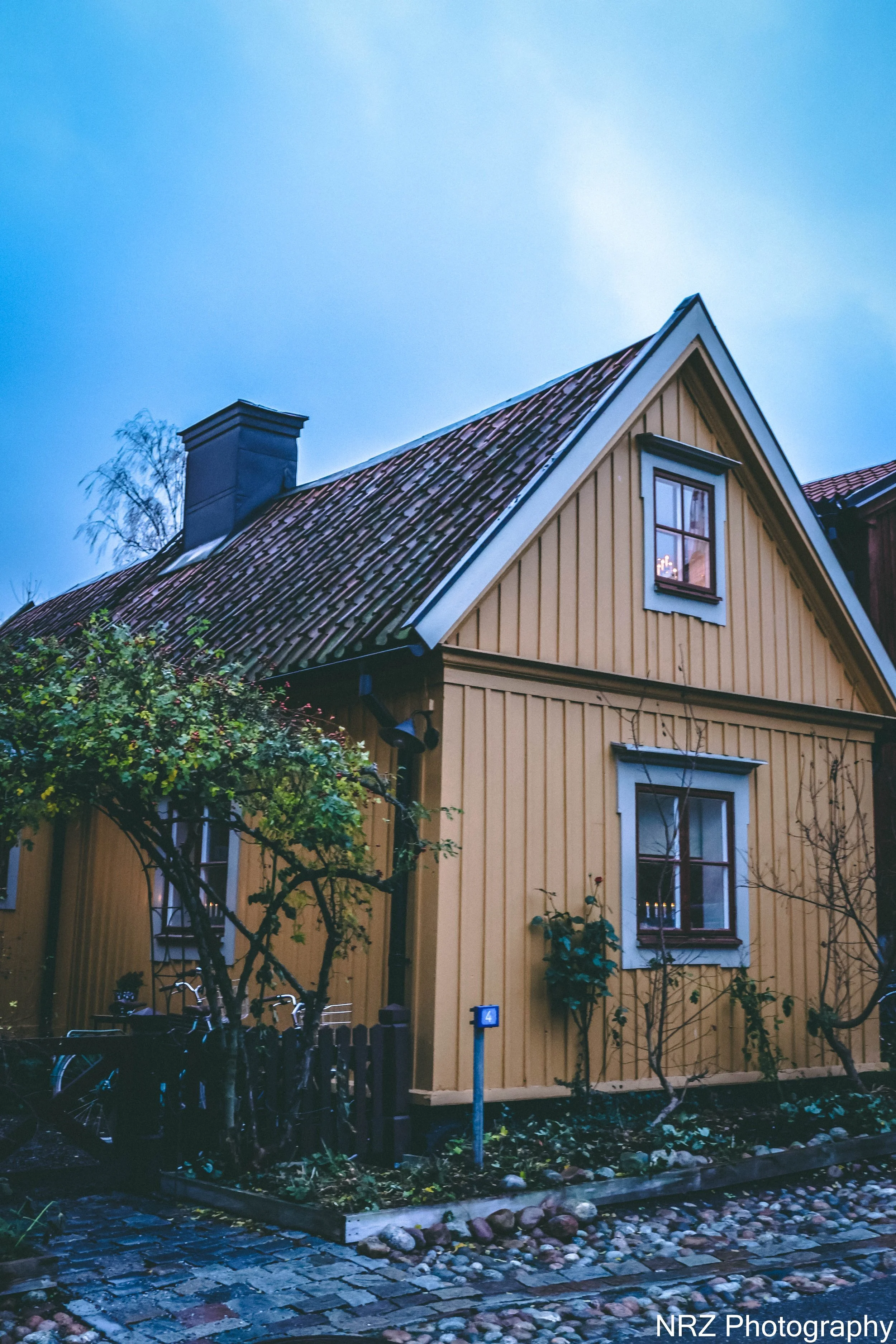
"Vinyl och vinterljus i hus nummer fyra" Det gula huset med den branta taknocken låg tyst under snöns mjuka filt. Ljuset från fönstren fladdrade som levande minnen, och inne i stugan sprakade den öppna spisen med en glöd som luktade kåda och trygghet. Utanför var världen blå av skymning, men här inne var det varmt inte bara i luften, utan i hjärtat. Elin bodde ensam i huset nummer fyra. Hon hade ärvt det av sin morfar, en man som samlade på jazzvinyl och trodde att varje bok var en portal. På julaftons kväll satte hon på en knastrig skiva med Billie Holiday, hällde upp varm äppelmust med kanel, och kröp ner i sin fåtölj med en bok om flygande bibliotek och talande ugglor. Snön föll tyst mot rutorna. I spisens sken dansade skuggor som liknade gamla sagoväsen kanske var det bara fantasin, eller kanske var huset magiskt på riktigt. Elin log för sig själv. Ensamheten var inte tom, den var fylld av berättelser, toner och eld. Och när klockan slog midnatt, reste hon sig, öppnade fönstret mot vintern och viskade: "God jul, morfar. Jag läser vidare."
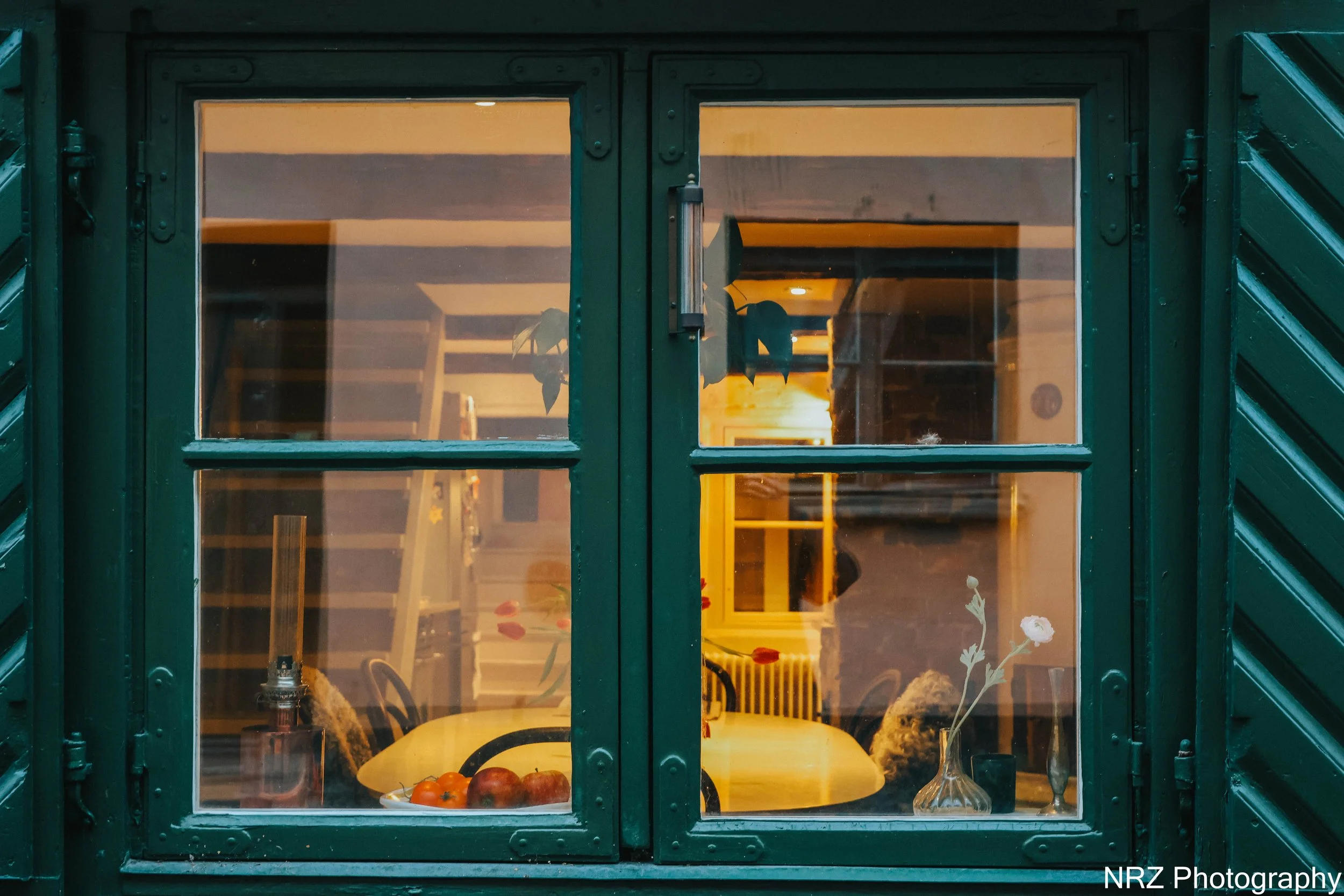
"Julnatten i Älvsala" Snön låg som ett mjukt täcke över Älvsalas tak, och i det gröna huset vid skogsbrynet glödde fönstren av gyllene ljus. Inne i stugan sprakade den öppna spisen, där björkved knastrade som om den viskade gamla hemligheter. På väggarna hängde fotografier av släktingar från förr sjömän, bagare, och en kvinna med röd sjal som sades ha räddat byns julmat under kriget. Vid det runda bordet stod en skål med vinteräpplen och tomater, en kanna glögg med nejlika och apelsin, och ett fat med saffransbullar som doftade barndom. Gustav, den grå katten med vit nos, låg hopkurad på en filt framför elden, som om han vaktade stämningen. Farmor Ingrid berättade om julen 1944, då hon och hennes syskon smög ut i snön för att lämna hembakta pepparkakor till grannarna som inte hade råd med något eget. "Det var kallt, men hjärtat var varmt," sa hon och log, medan hon hällde upp varm blåbärssoppa i små koppar. Utanför fönstret föll snön tyst, och inne i stugan fylldes rummet av skratt, dofter och minnen som om tiden själv satt med vid bordet, och julen var en evig låga i hjärtats spis.
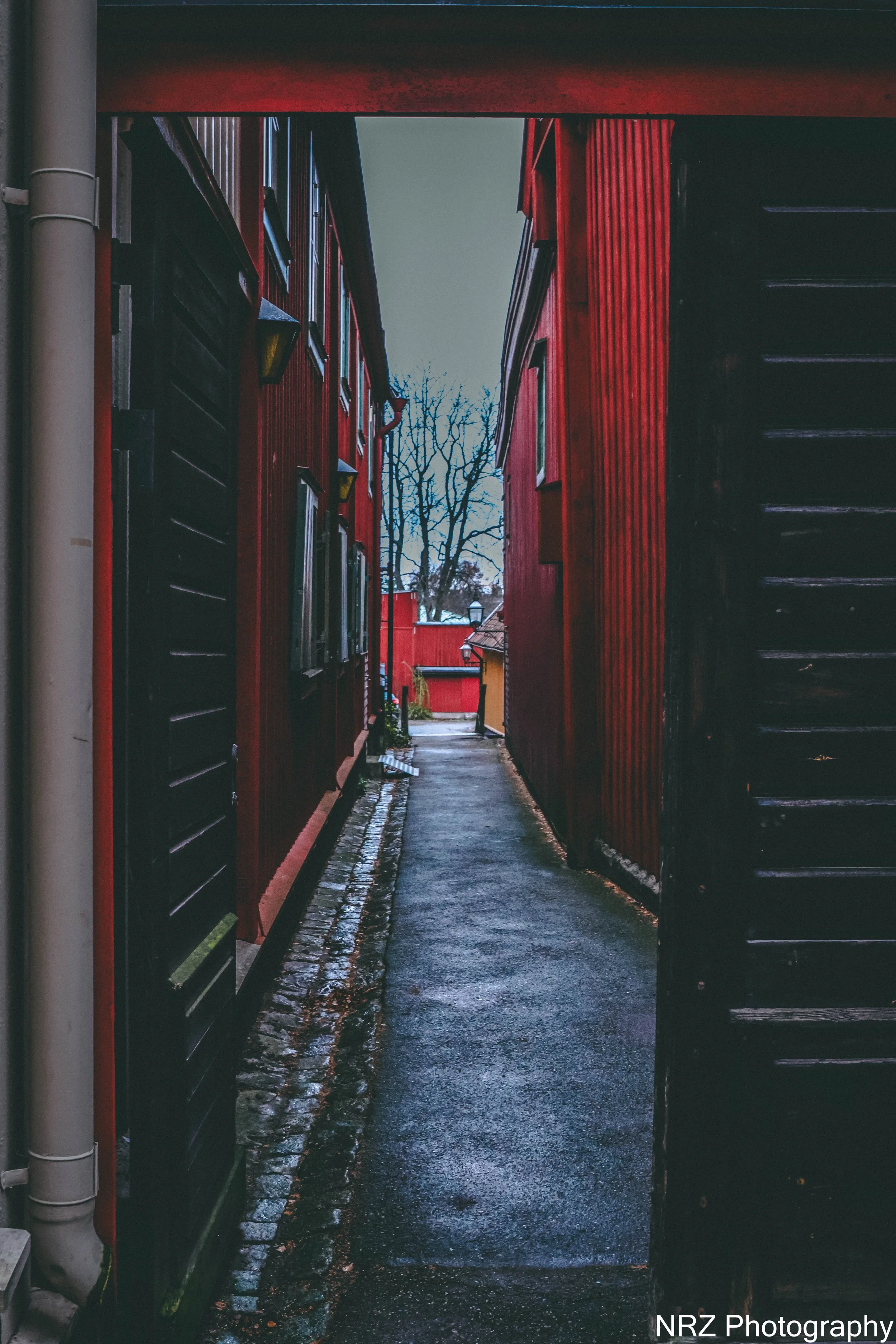
“Under ytan” – en sjömans sista minnen Jag var en man av havet, med saltet som min följeslagare och vinden som min sång. Den natten reste sig vågorna som berg, himlen slukade ljuset och skeppet brast som ett hjärta i storm. Jag kämpade tills mina händer inte längre kunde hålla fast, och havet tog mig i sin famn. Nu vilar jag bland vrakets spillror, där fiskar simmar genom min gamla koj och rostiga ankare sjunker djupare för varje år. Men minnena lever. Jag ser ännu min frus ögon, hennes skratt som var min kompass, och barnet som ritade båtar på köksbordet och frågade om sjöjungfrur fanns. Jag skrev brev till dem, med bläck som darrade av längtan. Brev om stjärnor jag följt, om hamnar jag lämnat, om drömmar jag bar. De ligger kvar i en ask av trä, doftande av tjära och tid. Och ibland, när vinden driver mig tillbaka mot land, ser jag den smala gränden mellan röda hus. Regnet glänser över stenarna, och längre bort lyser ett gult hus som en fyr. Där kunde jag ha gått, där kunde jag ha återvänt. Men nu är jag bara en röst i vinden, en far, en älskare, en skugga under ytan – och min kärlek till dem jag lämnat är starkare än stormen som tog mig.

“Hamnen vid världarnas rand” – berättat av Olle, ugglan Jag landade på en lyktstolpe vid kajen, vingspetsarna fuktiga av dimma. Vattnet låg stilla, som om det höll andan, och båtarna sov med sina segel tätt lindade. Himlen var grå, men inte tom – den bar på minnen. Från min plats såg jag staden sträcka sig mot horisonten, med torn och spiror som pekade mot sagor från förr. En kyrka viskade om förlorade löften, kranar blinkade som stjärnor från en annan tid. Jag är Olle, nattens budbärare. I min väska bar jag handskrivna brev – några från älskare som aldrig hann säga farväl, andra från barn som drömde om havet. Jag lämnar dem i båtkabiner, under däck, i fickor på gamla kaptenrockar. Hamnen är en plats där världar möts: historia, magi, längtan. Och jag vakar över dem, natt efter natt, tills vinden vänder och någon läser det som varit glömt.

“En vinternatts musik” – berättat av Gustav Jag heter Gustav. Vinterkatt, grändvandrare, och självklar gäst i huset där värmen bor. Utanför är världen frusen, men här inne glöder elden, saffransbullarna ångar, och glasen fylls med kryddig dryck. Vänner skrattar, någon spelar blues på en trasig gitarr, och jazztoner virvlar som snöflingor i taket. Jag ligger på fönsterbrädan, morrhåren vibrerar i takt med musiken. Böcker ligger utspridda – sagor om stjärnor, försvunna riken och danser under månsken. Det luktar pepparkaka, eld och äventyr. Någon dansar, någon drömmer, och jag spinner. Detta är min natt. En natt av värme, magi och musik.
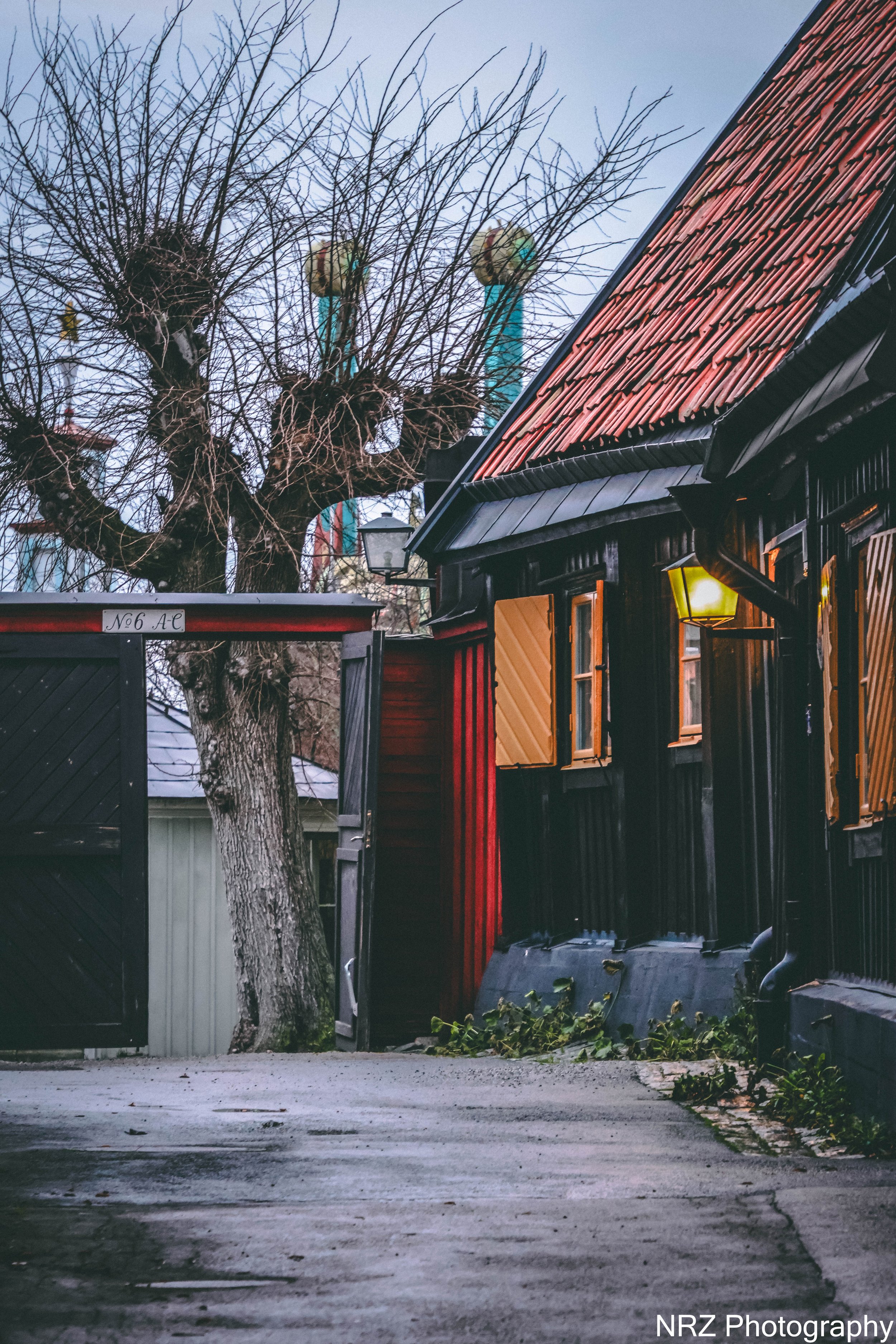
Stugans vinterhjärta I en undanskymd gränd i Djurgårdsstaden står en liten mörk stuga, som om den själv valt att gömma sig från världen. Utanför ligger snön tung över kullerstenen, lyktans sken darrar i vintermörkret och träden står nakna som väktare. När man öppnar dörren möts man av värmen från en sprakande öppen eld, lågorna dansar och kastar skuggor som rör sig över väggarna. Doften av nygräddade saffransbullar och kryddiga pepparkakor fyller rummet, blandad med den mjuka röken från veden. På bordet ligger böcker med slitna pärmar, och när man slår upp dem känns det som att stiga in i andra världar – sagor om försvunna riken, vinterhjältar och stjärnor som viskar hemligheter. Filten är tjock, tekoppen ångar, och varje sida man vänder blir en resa bortom tid och rum. Här, i stugans stilla hjärta, försvinner världen utanför. Man sitter nära elden, hör snön falla tyst mot fönstret, och känner att man är en del av något större – en plats där värme, doft och berättelser vävs samman till en magisk vinterkväll.
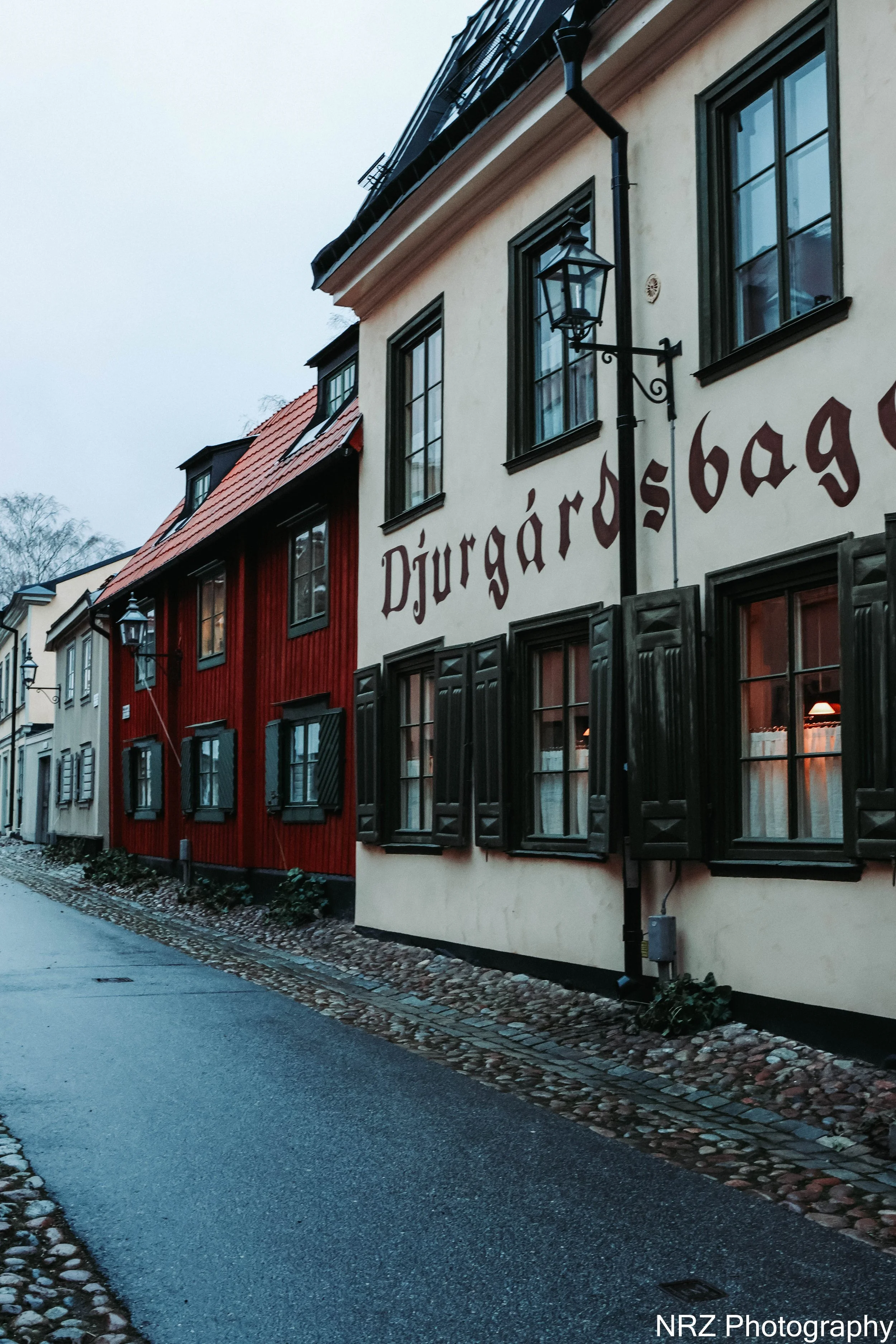
Det vita huset vid Djurgården – från hem till bageri På Djurgårdsstadens kullerstensgator, där regnet ofta glimmar som silver över stenarna och vinden sveper in från Saltsjön, står ett vitt hus med gröna fönsterluckor. Idag känner många det som Djurgårdsbageriet, men innan doften av nygräddade bullar fyllde luften var huset ett hem – ett hem som bar på en avgörande del av Sveriges nöjeshistoria. Familjen Lindgrens hem. I början av 1900-talet slog sig Johan Lindgren ner här med sin familj. Johan var mannen bakom Nöjesfältet, tivolit som öppnade 1924 på andra sidan Allmänna Gränd och blev Gröna Lunds främsta konkurrent. Det vita huset blev familjens bas, en plats där vardagsliv och affärsstrategi flätades samman. Vid köksbordet ritades skisser över karuseller, biljettpriser diskuterades och framtiden för Stockholms nöjesliv formades. När Johan gick bort 1940 tog sonen John Lindgren över både verksamheten och huset. John, född 1916 i Örebro och utbildad vid Påhlmans handelsinstitut, blev VD för AB Nöjesfältet. Under hans ledning fortsatte huset att vara ett nav för idéer och möten. Rivalitet och kärlek, Men huset bar också på en berättelse om kärlek som trotsade rivalitet. John Lindgren gifte sig med Ninni Nilsson, dotter till Gustav Nilsson som ledde Gröna Lund. Äktenskapet förenade två familjer som länge stått på varsin sida av ett bittert tivolikrig. Det sägs att många av deras första möten skedde just i det vita huset, där de fann en fristad bortom konkurrensens hårda fronter. När Ninni gick bort 1959 blev huset en plats av sorg, men också av styrka. Rivaliteten mellan Nöjesfältet och Gröna Lund var över – och det vita huset hade spelat sin roll i försoningen. Från hem till bageri, När Nöjesfältet lades ner 1957 och Gröna Lund blev den dominerande parken, förändrades också husets funktion. Familjen Lindgren flyttade vidare, och huset stod tomt under en tid. Men dess charm och historia gjorde det till en idealisk plats för något nytt. När Djurgårdsbageriet öppnade i byggnaden fick huset en ny roll inte längre som privat hem, utan som en mötesplats för alla. Det är ett levande minnesmärke och mer än ett bageri över en tid då svensk tivolikultur formades.
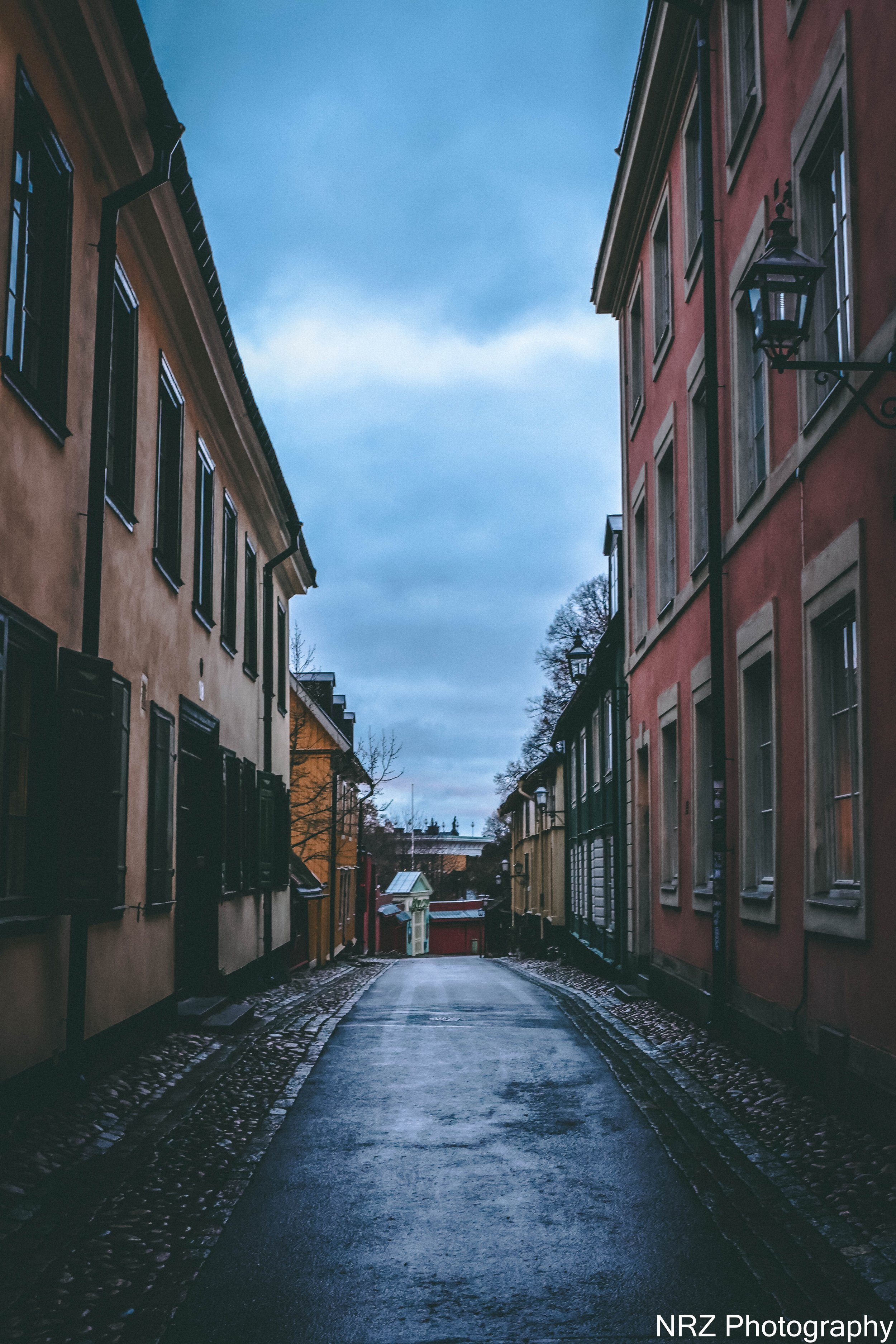
Gatan som glömde tiden Det var en regnig och grå decemberkväll när Elin återvände till den lilla kullerstensgatan i Gamla Staden. Hon hade inte gått där sedan barndomen, men något i henne hade dragit henne tillbaka en känsla av att något väntade. Kylan kröp långsamt in under kappan, och hennes andetag blev till små moln i luften. Gatans hus stod tysta, höga och färgade i blekt gult och rödbrunt, med fönsterluckor stängda som om de höll andan. Hon stannade vid en gammal lykta som fortfarande brann, trots att resten av staden verkade ha glömt den här platsen. Regnet droppade rytmiskt från takrännorna, och gatan glänste som ett spegelgolv. Längst bort skymtade hon det lilla huset med grönt tak det som mormor brukade kalla “Tidens Väktare”. Elin visste inte varför hon kommit. Hon hade bara följt en dröm, en viskning i natten, ett minne av en röst som sa: “Kom när regnet faller och vinden vänder.” När hon nådde huset med det gröna taket, såg hon att dörren stod på glänt. Hon tvekade, men något i henne visste att detta inte var en plats för rädsla. Hon klev in. Inne var det varmt, trots att ingen eld brann. Väggarna var täckta av böcker, kartor och gamla fotografier. En klocka tickade långsamt, men visarna rörde sig inte. På ett bord låg ett brev med hennes namn, skrivet med snirklig handstil. Hon satte sig ner och läste vidare. Brevet berättade om en gammal gåva – förmågan att höra platsers minnen. Mormor hade haft den, och nu var det Elins tur. Gatan, sa brevet, var inte bara en plats. Den var ett arkiv av känslor, steg, drömmar och hemligheter. Och den behövde någon som kunde lyssna. Elin gick ut igen. Regnet hade lättat, men dimman låg tät. Hon lade handen mot en husvägg och blundade. Först hörde hon bara vinden, men sedan kom röster barn som skrattade, en man som sjöng, en kvinna som viskade sitt farväl. Gatan talade. Hon gick långsamt, lyssnade, samlade. Varje steg blev en berättelse, varje sten en vers. Hon visste att hon inte kunde stanna för alltid, men hon kunde ge gatan något tillbaka – sin närvaro, sin förståelse. När hon nådde slutet av gatan, där den mötte den moderna världen, vände hon sig om. Lykttändaren – en gammal man med hatt stod där och nickade. Elin log. Hon visste att hon skulle återvända. Kanske inte imorgon, kanske inte nästa år. Men när regnet föll och vinden vände, skulle hon vara där.

Grändmusens Vintersaga från Danderydsgatan Jag är Grändmusen, liten som en nöt men klok som en farbror med stickad halsduk. Min värld är Danderydsgatan – en gömd vintrig gränd där varje hus viskar sagor. Snön ligger som florsocker på takpannorna. Genom nyckelhål och brevinkast smyger jag in: jag ser saffransdeg knådas, te sjuda, och gamla recept vakna till liv. Doften av smält ost och rosmarin slingrar sig ut i gatan. Inne i nummer 10 tänds ljus, och någon spelar Edith Piaf. Här finns värme, historia och magi. Och jag? Jag ser allt.
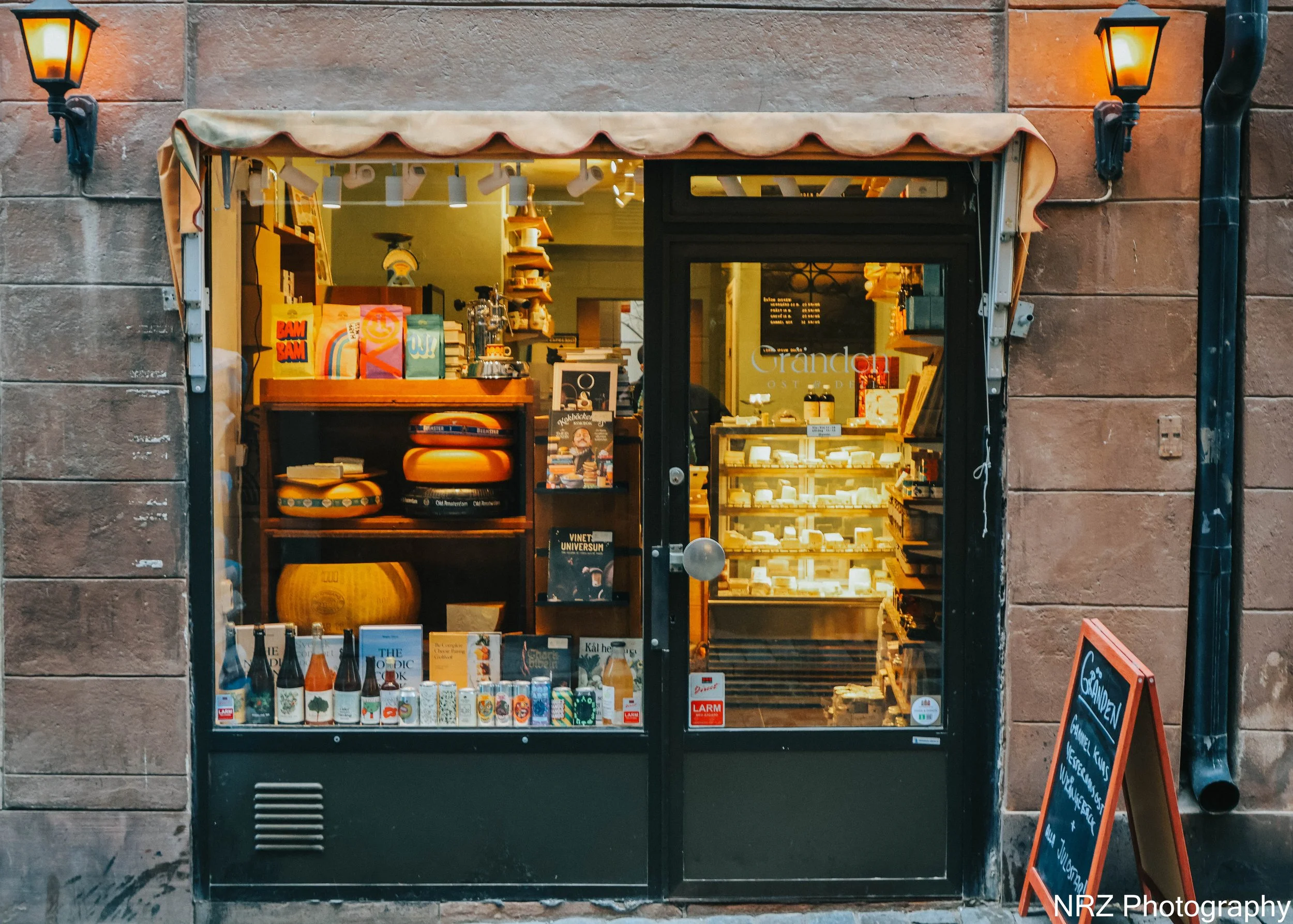
Gränden Ost & Deli – En ny doft i Gamla Stan Det började med en viskning längs kullerstensgränderna. En ny butik hade öppnat, där ost mötte poesi och varje hylla berättade en historia. Gränden Ost & Deli slog upp sina dörrar en krispig novembermorgon, och genast fylldes Gamla Stan med en ny sorts värme. Bakom den svarta dörren, prydd med handskriven meny och ett leende från personalen, väntade en värld av smaker. Fönstret dignade av osthjul från Alperna, krämiga svenska tegelostar, och småburkar med skagenröra och julskinka. En bok med titeln The Nordic Cook låg lutad mot en flaska vin, som om den väntade på att bli öppnad till helgens middag. Inne i butiken spelades lågmäld jazz, blandat med doften av nybryggt kaffe och kryddigt te. Hyllorna var som små altare – fyllda med franska kex med rosmarin, choklad från Malmö Chokladfabrik, och handgjorda smörknivar i ek. En glaskupa skyddade dagens ostval, medan parmesanrivaren glänste som ett smycke i metall. Kunderna kom in med röda kinder och nyfikna blickar. Någon frågade om Taleggio till kvällens pasta. En annan bläddrade i kokböckerna, letande efter inspiration till adventshelgen. Barn pekade på färgglada chokladkakor, och en äldre herre köpte en skärbräda med orden: “Den här ska få stå framme.” Gränden Ost & Deli blev snabbt mer än en butik. Den blev ett vardagsrum för kvarteret, ett ställe där man stannade lite längre än man tänkt. Där samtal uppstod över ostdisken, där recept byttes och där varje produkt bar på en berättelse – precis som Gamla Stan själv.

Below the Surface: Tales from Violette and Kirsten The harbor is quiet this morning. Mist curls around the lifebuoys and ropes, and the wooden boats—Violette and Kirsten—rock gently in rhythm with stories long stored in their hulls. On deck sit two old friends: Einar and Stig, both in wool sweaters patched with salt and time. They’ve sailed these waters for decades. Not for glory, not for gold—but for the hush of the Baltic, and the secrets it keeps. “There are more shipwrecks down there than stars in the sky,” Einar says, sipping coffee brewed over a tiny gas flame. “Some still whisper.” Their boats are floating homes. Violette smells of smoked herring and birchwood; Kirsten of tar, rye bread, and elderflower cordial. Meals are simple: potatoes boiled in seawater, pickled beets, and lingonberry jam on hardtack. After supper, they sing—old sailor’s songs, half-forgotten verses about mermaids, storms, and the ghost ships that glide beneath the moon. Stig once dove near Utö and found a brass compass lodged in a wreck from 1712. He keeps it in a velvet pouch, tucked beside a photo of his late wife. Einar swears he once heard bells ringing from a sunken church off the coast of Gotland. “The Baltic doesn’t give up its dead,” he says. “But it lets you listen.” Their boats may be marked PRIVAT, but their stories are not. They share them freely—with dockhands, children, and curious photographers. Each tale is a net cast into memory, pulling up warmth, wonder, and the weight of what lies below.

Harbor Harmonies: Two Boats, Two Tales In a quiet harbor where the city hums just beyond the masts, two boats rest side by side—one wooden, weathered and wise; the other sleek, modern and meticulous. Their hulls may differ, but each carries a story stitched with warmth, meals, and music. The Green-Tarped Wanderer The wooden sailboat, draped in a green tarp like a shawl against the autumn chill, belongs to Olle and Märta—retired teachers turned sea-bound storytellers. Inside, the cabin smells of cardamom and pine. A cast-iron pot simmers on the stove: root vegetable stew with smoked tofu, served with sourdough baked in a tiny oven bolted to the galley wall. Evenings are for songs. Märta plays the nyckelharpa while Olle hums old ballads from Dalarna. Their dinghy, perched like a loyal pup on deck, has ferried them to islands where they’ve traded tales for firewood and jam. The Gray-Decked Nomad Next door floats a modern sailboat, all clean lines and polished fittings. It belongs to Amina, a solo sailor and marine biologist who writes lullabies for the ocean. Her meals are precise and poetic: miso-glazed aubergine, jasmine rice, and ginger tea steeped while reading tide charts. Her evenings are quiet but rich. She records sea sounds and overlays them with soft vocals—songs not meant for crowds, but for the creatures below. Her cabin glows with LED lanterns and dried lavender tucked into the shelves. In the hush between tides, these two vessels share more than mooring lines. They are floating hearths, each with its own rhythm—one steeped in tradition, the other tuned to the future. And in the harbor’s gentle sway, their stories drift together like verses in a shared song.

The Breadmaker’s Silence The cabin stood like a secret whispered into the forest—timber hewn by hand, nestled among pine and birch. It was the kind of place that didn’t appear on maps, only in memories or dreams. Inside, the stone-framed fireplace crackled with a steady flame, casting amber light across the cast iron stove and the worn wooden floor. The air was steeped in rosemary, chamomile, and the tang of sourdough crust just pulled from the oven. Noah, twenty-eight, moved through the cabin with a quiet grace, his body still young but heavy with grief. Rusty, his aging bloodhound, lay curled on a braided rug, snoring softly. Noah had built this cabin after the last goodbye—after the laughter of old friends had thinned to silence. Five remained, scattered like stars he rarely saw. He had tried. Dating apps, speed events, awkward coffee shop meetups. But grief clung to him like moss, and no one stayed long enough to understand the language of his silence. He baked. He kneaded dough with hands that once held cameras and shoulders that once carried hope. His sourdough starter was alive with wild yeast and quiet resilience. Each loaf was a ritual: feed, fold, rest, bake. A rhythm that kept him tethered. But photography that was his soul. He wandered the woods with his battered Canon, capturing frost-laced spiderwebs, the curve of a fox’s tail, the way light filtered through fog like whispered forgiveness. He didn’t post them. He printed them, hung them in the cabin, and named them like old friends: “Stillness,” “Ash and Fern,” “Rusty in Snow.” At night, Noah would light a lantern, pour tea, and drop the needle on a vinyl record. Ray Charles, Sam Cooke, Fleetwood Mac and sometimes Frank Sinatra. The crackle of the record player was a kind of company. Rusty would lift his head, sigh, and settle again. He didn’t believe in miracles. But he believed in bread. In the way sourdough rose despite the cold. In the way a photograph could hold a moment forever. In the way Rusty’s eyes still sparkled with loyalty. And maybe, just maybe, that was enough.

Autumn whispers through yellow leaves, brushing the old brick with breath from centuries past. The sculpted figure above the doorway watches still, as if waiting for a knock that never came. Chill air curls around the stone steps, carrying echoes—footfalls, laughter, secrets. The building stands not just in time, but in memory. And in the hush between heartbeats, you feel it: something long ago, still lingering, still listening.

The alley curled like a whispered secret, its cobblestones cool beneath the hush of autumn air. Lanterns swayed gently, casting golden light on weathered walls painted in warmth—ochre, rust, and rose. Bicycles rested like old friends, and every window seemed to hold a story. The chill nipped at noses, but the charm of aged stone and quiet corners wrapped the soul in comfort. A stroll here felt like stepping into a memory.

Stone arches stretch like time itself—quiet, steady, and full of secrets. Each column holds a whisper, each tile a memory. The corridor’s rhythm feels almost musical, like a fugue in limestone and brick. At the far end, the ornate gate stands like a final brushstroke—delicate, deliberate, and full of promise. Light spills softly across the patterned floor, revealing the artist’s hand in every curve and shadow. A passage not just through space, but through crafted silence.

Beneath the archway, autumn whispered its golden secrets. The old courtyard, wrapped in mist and memory, held the hush of falling leaves and distant bells. A lone tree blazed orange against the stone—like a lantern lit for wandering souls. Cobblestones echoed with stories: of warm cloaks, shared laughter, and letters tucked into satchels. Somewhere beyond the fog, tea steamed and windows glowed. And for a moment, the world paused—wrapped in the quiet magic of October.

The Rain Beneath the Roof Outside, the rain taps like an old friend on the windowpanes, steady and soft. Inside, the fire crackles—wood hissing, popping, whispering secrets only October understands. A kettle hums on the stove, and the scent of cinnamon, cloves, and damp leaves fills the room. This house has held generations. Grandmothers who baked apple bread with stories folded into the dough. Uncles who played blues on the porch until the fog swallowed the last note. Children who built forts from quilts and named every raindrop. Tonight, the old armchair sighs beneath a familiar weight. A journal rests on the lap, half-filled with poems and sketches of trees that only turn gold in memory. The dog snores by the hearth. A mug steams beside a stack of letters never sent. Here, time slows. The rain becomes rhythm. The fire becomes voice. And the heart, wrapped in wool and wonder, remembers that some seasons aren’t meant to be rushed—they’re meant to be felt.

Munchens Bryggeri: Where the Glasses Glow Tucked between cobbled streets and golden rooftops, Munsheins Bryggeri brews more than beer—it brews belonging. The scent of hops mingles with cinnamon and roasted garlic, drifting through open windows where jazz and laughter spill into the street. Inside, strangers clink glasses and leave as friends—sometimes family. A violinist plays during golden hour, and once, a couple danced between tables to a blues trio, their love sealed with stout and swing. Chefs serve stories with every plate, and brewers whisper secrets to the foam. Birthdays, proposals, reunions, and quiet Tuesdays—every night is a celebration. The walls hum with memory, the floors remember every footstep. Even the chandeliers seem to sway with joy. Here, beer is crafted with care, events bloom like wildflowers, and the air is thick with warmth. You don’t just visit Munsheins—you become part of its story. So come thirsty. Come curious. And leave with a heart full of laughter, a pocket full of memories, and maybe a new favorite song.

The Steps Between Stories The staircase between the ochre buildings is no ordinary climb—it’s a corridor of stories. In autumn, the stone steps hum with echoes: bakers rising before dawn, their laughter dusted in flour; chefs who sang lullabies to simmering pots. Writers scribbled verses on napkins, poets recited to pigeons, and one violinist played only during fog, claiming mist softened heartbreak. Jazz and blues spilled from open windows—notes curling like chimney smoke. A woman named Lykke danced barefoot every October, swearing the leaves whispered secrets. Some say a ghost named Emil still hums Billie Holiday beneath the streetlamps. The tree between the buildings grew from a seed dropped by a lovesick gardener. It blooms late, defiantly golden. Locals swear it listens. Walk slowly here. The air is thick with cinnamon and memory. Every step is a page. Every lamp, a spotlight. And if you pause halfway, you might hear a saxophone sigh—or a poem waiting to be spoken.

Maria Hissen’s Heart I was born in 1887 to lift Stockholm’s dreamers between hill and harbor. I’ve carried poets with jammy fingers, lovers who kissed between floors, and once—a frog in a top hat who danced during a proposal. I’ve swayed with tango dancers during thunderstorms, listened to breakups whispered between brass rails, and cradled birthday balloons that bumped my ceiling with joy. They closed my doors in 1937, but I waited. In 1961, Stockholm gave me new life. My orange façade was restored to its marmalade glory, and inside—offices, event spaces, and ideas began to bloom. Now I host brainstorms, birthdays, and midnight musings. I’ve heard pitches about toothpaste and poetry. I’ve seen interns fall in love over coffee and creatives cry over deadlines. I may no longer ferry the public, but I still hold stories. My gears groan, my soul sings. So if you pass by, tip your hat. I’m still here. Still listening. And if you’ve got a frog in formalwear—he knows the way.

A Tea Tale As told by Murph the Cat Rain taps the windows like an old friend. The wind dances with russet leaves, swirling secrets down the chimney. Inside, warmth hums—a wood-burning fireplace crackles, casting amber light across my whiskers. I, Murph, curl atop the checkered armchair, threadbare but noble. Around me: scrolls, books, and the scent of stories. A vintage lamp glows in the corner, and beside me, a small wooden table cradles a cup of freshly brewed tea—chamomile, I believe. My human, Elspeth, reads aloud, voice soft as wool. She doesn’t know the scroll behind her holds a map to the Whispering Street or that the tea, brewed just so, lets me understand the wind. But I do. And tonight, as the storm sighs and the fire settles, I’ll tell her. Not all at once—just a whisper, curled in purrs. Because every tale worth telling begins with tea.

Tea at Five An Autumn Evening with Elsie Every evening at five, Elsie sat by the arched window of the beige building, a mug of cardamom tea warming her hands. The city outside bustled—trams clanged, heels clicked, and the skyline gleamed like polished bone. But Elsie watched the shadows. She believed the old buildings whispered at dusk, trading stories through brick and ivy. The red one remembered a baker who sang to his dough. The yellow one once housed a violinist who played only in rain. Tonight, a breeze stirred the tree branches, and Elsie swore she heard a hum—low, melodic, familiar. She smiled, sipped her tea, and whispered back, “I remember, too.” The modern tower blinked in silence. But the old facades glowed faintly, as if warmed by memory

Lanternlight and Stew An Autumn Evening with Mira Mira lit the lantern on her windowsill, its amber glow flickering against the pane. Outside, the wind rustled copper leaves, but inside, the world was hushed. Her cottage smelled of thyme and root vegetables—stew simmering slow on the stove. Thistle, her marmalade cat, curled on the hearth, one ear twitching to the crackle of the fire. She settled into her rocking chair, quilt over her knees, and opened the old storybook with its frayed ribbon bookmark. Tonight’s tale was about the Whispering Street, where lanterns guided lost travelers and cobblestones remembered names long forgotten. As she read aloud, her voice wove through the room like steam from the stew pot—gentle, fragrant, familiar. Thistle purred. The fire sighed. The lantern glowed steady. When the last word was spoken and the stew cooled to comfort, Mira stood, kissed Thistle’s head, and whispered, “Sleep well, little one.” She blew out the lantern. The glow faded. The story lingered.

Lady Morven o’ Dunbrae Row Come in, love. The kettle’s near boiled and the fire’s cracklin’ just right. Ye’ve come for a story, have ye? Well then, sit yersel doon and I’ll tell ye true. Dunbrae Row’s stood longer than I’ve been breathin’. Stone laid by monks wi’ prayer in their bones, roofs tiled like burnt embers, and balconies that groan wi’ secrets. Folk say the wind here kens names, and the rain sings to the stones. I’ve lived in this house since I was a lass, married to Ewan the stonemason—his hands strong, his laugh like thunder on the moors. He carved our iron railin’ wi’ care, said it’d hold firm even if he couldn’t. He passed in the frost o’ ’72, and I’ve lit a lantern in the window every evenin’ since. Not for the livin’, mind ye—but for him. So he’ll find his way, should the mists ever lift. The bairns whisper I speak to crows, that my tea smells o’ heather and secrets. Let them. I keep the old ways. I ken the veil’s thin in October, and the dead walk soft. Last All Hallows’ Eve, the lantern flickered thrice, then went dark. I left my braid on the sill and stepped into the fog. If ye listen close, when the rain taps the tiles and the wind hums low, ye’ll hear Dunbrae remember. And maybe, just maybe, ye’ll feel me smilin’ through the mist. “Hold fast to love, even when it fades from sight. The heart remembers what the eyes forget. And kindness, like lantern light, always finds its way home.”

Captain Ellory’s Last Crossing The harbor was quiet, save for gulls and the slap of water against the dock. Autumn had painted the trees in fire—orange, gold, rust. Captain Ellory walked slowly, coat heavy with years, boots tapping a rhythm only he remembered. The Marigold waited—white hull, yellow funnel, her brass dulled but proud. She hadn’t sailed in years, but today she would. Ellory packed light: a journal, a flask of tea, and the compass his father gave him. He stepped aboard. The deck groaned softly. The ropes were loosed. The engine sighed. As she pulled away, the scent of salt and old wood rose from the water, the tide whispering beneath her hull. He passed the waterfront. People waved. Children pointed. Ellory tipped his cap. The trees shed leaves like blessings. Beyond the bridge, the water opened wide. He read the museum’s letter once more, then tucked it into his journal. “Let them have the maps,” he murmured. “The sea keeps the rest.” The Marigold sailed on, her wake trailing like ribbon. The sound of the sea beneath her was steady, eternal. Captain Ellory, hands on the wheel, smiled into the wind. “The trick,” he whispered, “is not to outrun the storm, but to know when to let the wind carry you. Leave behind what’s heavy. Keep what sings.”

Duchess of Wickerbone Lane I am Duchess. No surname needed. I reside in a five-story townhouse dressed in pink and red, perched on a velvet pouf in the solarium, watching birds gossip and leaves twirl. My fur is white as whipped cream, my eyes moonlit moss. Each morning begins with warmed cardamom milk and Petunia fluffing my cushions just so. Afternoons are for correspondence and critiques of local gardens. Evenings, I recline by the fire, sipping cream from porcelain, hosting salons where hedgehogs read haiku and raccoons dance. Life is not rushed—it is curated. Should you wander down Wickerbone Lane and glimpse a flicker of white in the window, know that Duchess is home. And the hearth is warm. Yours in elegance, Duchess

"Beyond the iron gate, the cobblestone path glowed with the hush of fall. Leaves blazed in reds and golds, rustling like old stories. A bicycle leaned in wait, and from a nearby window, the scent of steeped black tea and cinnamon drifted out—warm, familiar, inviting. The air was brisk, but the light was honeyed, and every step forward felt like walking into a memory stitched with scarves, steam, and the soft hush of turning seasons."

"Beneath spired rooftops and golden trees, the city exhales a brisk breath of autumn. Warm hues dance across red brick and cream facades, while the cool air carries whispers of nostalgia and change. It’s the season of soft scarves, amber light, and quiet wonder—where every leaf seems to tell a story, and every shadow feels like a memory waiting to be remembered."

An Old Wife’s Tale Told by the wife herself, spoon in hand and kettle on Ah now, it was soup night, so it was, and I’d just tossed in the leeks when the shutters on number ten snapped shut like a priest’s book in a storm. I says to Merriweather, “That house is haunted, mark me words.” She says it’s the lace curtains. I says, “Lace don’t click, love.” The geraniums bloom twice as bright there, sure as the moon. Mrs. Poppel swears it’s magic in the soil, but I say it’s the talk. Rumours root deeper than carrots, and we old wives know how to water 'em proper. Last week, the clock struck thirteen. I checked it twice, I did. And the chimney puffed lavender smoke, like a dream gone sideways. I told me husband it was soot, and he says, “Soot don’t smell like bedtime stories.” Now hush, keep stirrin’. If the roof creaks after dark and the shutters shine come mornin’, it means the tale’s true. And if you see someone in the hall who wasn’t invited—offer ‘em tea. Ghosts love a good steep. We old wives never lie. We just embroider with a bit o’ flair.

The Garden Street Whispers Told by Poe the Raccoon, scarf askew, nose dusted with flour Come closer, friend. Let me show you the crooked little street I call home. It twists like a cinnamon stick through the trees, lined with cottages that lean kindly toward each other, as if sharing secrets. Each garden bursts with potatoes, carrots, thyme, and the occasional gossiping sunflower. The gravel path crunches under paw, and the air—oh, the air!—smells of damp leaves, baked apples, and spice jars that hum when stirred. Inside, it’s all wooden beams, open hearths, and quilts that remember stories. I, Poe the raccoon, wander from door to door (purely for research), sampling scones, sniffing stews, and jotting notes in my journal. Mrs. Fern’s rosemary once told me a riddle. Mr. Thistle’s pumpkins glow faintly at dusk. True tales, every one. Beyond the trees, a high-rise watches us. Let it. It’s never tasted Mrs. Maple’s parsnip pie or heard the garden gates creak like old lullabies. This street is stitched with magic—quiet, warm, and rooted deep. And I? I’m its whiskered witness. Pull up a chair. There’s cider on the stove and stories in the steam.

An Old Troll’s Tale Told by Mossbeard, retired bridge guardian and garden dweller I wasn’t always tucked behind this red cottage, sipping rosehip tea and puffing my herb pipe while the leaves rustle like old secrets. No, once upon a fog-thick autumn, I stood beneath a stone bridge, beard tangled with river moss, guarding the way between worlds. Travelers came with riddles, songs, and offerings—one fox sang so sweetly, the stones wept. I let him pass, and ever since, his tune curls through my chimney when the wind’s feeling wistful. Now I tend pumpkins that hum in moonlight, chat with wrens who remember names, and watch the wreath on the door for signs. Magic hasn’t left—it’s just quieter now. It settles in the soil, hides in the ivy, and waits in the steam of my tea. Tonight, the pipe smoke swirls like memory, and I swear the garden gate creaked in reply. I puff, I sip, and I listen. Always. Because some tales don’t end—they just grow roots.

The Acorn Behind the Chimney Told by Nutley the squirrel, scarf snug, cider steaming Every evening, as the sky blushes and the city hums below, I climb to my favorite rooftop perch. There’s a ship’s mast poking out of the building (don’t ask), a turret that looks like it dreams in Latin, and a glowing red sign that simply says Drink. So I do mulled apple cider, with a cinnamon stick and a dash of nutmeg. The real secret? It’s the acorn I tucked behind the chimney last autumn. Not just any acorn—this one listens. To wind. To whispers. To the stories the city forgets. I check on it each night, sip my cider, and wait. Sometimes, when the breeze is just right, it tells me something new. Tonight, it murmured: “The sign hums for those who remember.” I don’t know what it means yet. But I will. I always do.

A Street with a Secret Told by Flopsy the Hare, sipping carrot tea with a splash of nutmeg and a dash of drama Well now, gather close! I’m Flopsy—yes, that Flopsy—and I’ve got a tale twitchier than my whiskers in a windstorm. I’m sittin’ here on this cobblestone street, leaves crunchin’ like toast underfoot, sippin’ warm carrot tea (extra cozy, hold the judgment). These red wooden houses? Snug as a hedgehog in a hammock. But this street—hoo boy—it’s got a secret. Long ago, when squirrels wore monocles and the moon still sent postcards, a fox named Muffin buried a golden acorn right beneath that lamp post. Not just any acorn—this one whispered stories to whoever held it. Ghosts of sea captains, love-struck owls, and one badger who claimed he invented soup (he didn’t). Every autumn, the wind tries to dig it up, rustling the leaves like it’s nosy. But Muffin’s enchantment holds strong. So I sit here, sipping my tea, ears perked, waiting for the wind to spill the next tale. Sometimes… it does. Usually right after I burn my tongue.

A Port Full of Stories as told by Fenwick the Fox, with a cinnamon stick in his tea The fire crackled low, casting amber shadows on the den’s stone walls. Fenwick curled his tail tighter around his paws, the steam from his mug curling like ghostly fingers. Outside, the wind rustled through the copper leaves, and the scent of salt and smoke drifted in from the harbor below. “Ah, but you’ve come for a tale,” he murmured, voice soft and gravelly. “And this one’s older than the tide.” Long ago, when the port was young and the ships still carved their names into the sea, there was a vessel called The Wren’s Hollow. Painted crimson and gold, it sailed only in autumn, and only under a waning moon. The townsfolk whispered it carried no crew—only lanterns that flickered without flame, and sails that moved without wind. One foggy dusk, a boy named Elias followed the sound of bells to the dock. He found the ship waiting, ropes slack, gangplank lowered. No one saw him board, but every night since, the harbor bells ring at sunset, and the scent of cinnamon and sea brine fills the air. Some say Elias became the ship’s keeper, ferrying forgotten souls across misty waters. Others claim he returns each October to leave messages in bottles along the shore—warnings, riddles, or love letters from the other side. Fenwick sipped his tea, eyes glinting. “I’ve found one, you know. A bottle. Inside was a pressed leaf and a note that read: ‘The wind remembers. Do you?’” The fire popped. A chill danced down Fenwick’s spine. As the fire dimmed and the harbor winds sighed through the trees, Fenwick whispered, “Some stories never dock—they just drift, waiting for someone brave enough to listen.”

Squawk! It’s Autumn, You Say? by Percival the Parrot of Leaf & Lantern Oh ho! What’s this? A chill in the air? Leaves doing cartwheels with flair? I declare! The trees are ablaze—red, orange, and gold, Like someone spilled cider and let it unfold! I flapped through the park with a scarf on my beak, Squawked at a squirrel, who gave me a squeak. The sun winked low, like it knew a good joke, And the breeze smelled of cinnamon, bread, and oak. A fox in a waistcoat tipped me his hat, While mushrooms debated the merits of that. I perched on a branch with a thermos of tea, Murmured to moss and rustled with glee. The lanterns were lit, the sky blushed pink, And I scribbled a poem in nutmeg ink. “Come closer!” I chirped, “Don’t miss the show— Autumn’s a party, and you’re in the front row!” There’s a blanket of dusk and a pie on the sill, A kettle that sings and a breeze that’s still. So follow the path where the leaf-lanterns glow— Percival’s waiting, with tales to bestow!

Thumper’s Invitation by a rabbit with a nose for cinnamon Hop along, friend—don’t dawdle now, The sun’s dipping low behind chimney and bough. The air’s gone crisp, like apple skin, And the wind wears scarves as it tumbles in. Leaves rustle secrets beneath your feet, Amber and gold in a swirling fleet. The city glows in a honeyed hue, And even the rooftops seem kissed by dew. My kettle sings on the fire’s soft crack, With thyme and clove in a steamy stack. There’s bread on the sill, still warm, still sweet, And a blanket of dusk where the treetops meet. So come to my burrow, tucked under the hill, Where stories steep and the world stands still. I’ve saved you a seat and a mug of delight— Let’s welcome the evening, soft and right.

A Librarian Tale The kettle whistles softly over the fire as I sort ancient parchment by candlelight. Cinnamon and rosemary drift through the cabin, mingling with the scent of fresh bread cooling on the sill. My fingers trace inked secrets in forgotten tomes, each page a whisper from the past. Outside, autumn rustles. Inside, warmth reigns. I sip spiced tea, tuck a sprig of thyme in my journal, and let the stories settle like dust—quiet, sacred, and alive.

A Housemaid’s Secrets They think I just polish silver and fluff pillows. Ha! I know who sneaks extra pastries, who swaps sermons for naps, and who mistook the bishop’s wig for a mop—scrubbed the entire east wing with it before anyone noticed. Autumn cloaks the manor in golden hush, but behind every curtain, whispers bloom. I steep my tea with cinnamon and scandal, jot notes in my recipe book-slash-diary, and smile sweetly. A clean house runs best on secrets and spice.

Milly’s Autumn Tale I’m Milly, a hedgehog with a nose for cinnamon and cozy corners. The leaves crunch beneath my tiny paws as I waddle down the stone path, golden and crisp. My cottage is tucked between roots and moss, warm with the scent of roasted chestnuts and spice. I brew berry tea in my acorn kettle and nibble apple crumble by the fire. Outside, the wind hums. Inside, I gather stories like fallen leaves—soft, quiet, and full of wonder.

Golden leaves drift past the window as the scent of burning wood curls through the air—earthy, warm, and familiar. The fire crackles softly, casting flickers of amber light across worn blankets and quiet corners. A cup of spiced autumn tea warms your hands, steeped with cinnamon, apple, and clove. Outside, the world glows in rust and gold. Inside, everything slows. This is the season of stillness, of comfort, of coming home to yourself.

A Church Mouse Tale I live beneath the old pews, where sunlight paints the stone in golden hush. The choir’s echoes warm my heart, but it’s the kitchen that calls me most—crumbs of cheddar, a splash of berry tea, and the scent of fresh bread from Sister Agnes’s oven. I nibble in peace, listening to sermons about grace and kindness. They say even the smallest soul has purpose. I believe them. I am small, yes—but I carry warmth wherever I scurry.

The Chef’s Tale Tucked behind golden trees, the hidden cottage breathed spice and smoke. Inside, the chef stirred a pot of wild mushroom stew, herbs gathered from the forest floor. Loaves cooled by the window, steam curling into the crisp autumn air. No menus, no guests—just recipes whispered from memory and meals made with love. The forest knew him, and he cooked not for fame, but for the joy of feeding the quiet world.

A Baker’s Tale Nestled deep in the autumn woods, the cottage glows with warmth. Inside, the air dances with cinnamon, clove, and nutmeg. Loaves of rye, sourdough, and honey oat cool on linen-covered shelves. A kettle hums, steeping fruit tea—plum and orange. Outside, leaves fall like whispered blessings. Inside, the baker smiles. This is home.

The Story of Redberry Hollow Narrated by Merlin, the Owl in the Red Armchair The fire murmured softly, casting flickers of amber across the timbered walls. Outside, the cobblestone lane was dappled with fallen leaves russet, gold, and copper whispering secrets as they danced in the wind. Inside Redberry Hollow, the single-room cottage glowed with the scent of cinnamon and pine. Wooden beams stretched overhead like the arms of an old tree, and the floorboards creaked with the comfort of memory. The kitchen, lined with copper ladles and earthenware jugs, hummed with quiet purpose. A wood-burning stove crackled in the corner, its iron belly holding the warmth of a thousand winters. In a plush red armchair by the fire sat Merlin, an owl of gentle wisdom. His round glasses perched on his beak, and a steaming mug of peppermint tea rested beside him. He held a red book titled The Story of Redberry Hollow, its pages worn soft by time. He cleared his throat a sound like wind through autumn leaves and began: “It was the first morning of October,” he said, his voice low and golden, “when Thistlewick arrived.” She was a mouse archivist, small and sprightly, with a satchel stitched from thistle thread and boots made of walnut leather. She came seeking stories, Redberry Hollow welcomed her like an old friend. She unpacked her scrolls and ink pots onto the long wooden table, “I’ve heard this house remembers,” she said, her voice like parchment. “I’m here to listen.” Merlin blinked slowly. “Then you’ll want the attic.” Beneath a quilt stitched with autumn leaves, she found a chest one letter, written in looping script on faded parchment, told of a snowstorm long ago when the house sheltered a lost fox cub. Redberry Hollow glowed not just with firelight, but with remembrance. “The world rushes, tumbles, forgets. In here remembering is a kind of magic, don’t you think? The kind that keeps us warm long after the fire’s gone out.” “If ever you find yourself lost, or longing, or simply in need of a quiet place to rest your thoughts… come back to Redberry Hollow. The kettle will be on. The stories will be waiting, and I’ll be right here.”

Winston’s October A Bulldog’s Tale, Told in His Own Words Ahem. Allow me to introduce myself properly. I am Winston Barkley III bulldog by breed, scholar by calling, and raconteur by divine appointment. I wear a black bowler hat, a matching bow tie, and carry a cane topped with a golden eagle, which I assure you is not for show (though it does sparkle rather nicely in the sun). This tale begins long ago, on a sunny October day the kind of day that makes you believe in poetry and pastries. The air was crisp, the cobblestones warm beneath my paws, and the scent of cinnamon and fresh bread danced through the streets like a Parisian ballerina. I had just finished my morning constitutional (a dignified stroll, not to be confused with a sprint), when I came upon the house. Ah yes, this house. Green-paneled, red-trimmed, and charmingly crooked in the way only old buildings and professors’ noses tend to be. It stood on a quite street like a forgotten stanza of a love poem quiet, proud, and full of secrets. I was immediately intrigued. Not by its architecture, mind you (though I do appreciate a good cornice), but by the energy. The sort of place where stories linger in the windowpanes and ghosts sip espresso in the attic. Naturally, I knocked. With my cane, of course three polite taps and one flourish. The door creaked open. Inside, the house was a symphony of creaks and whispers, each floorboard humming with history and the faint scent of bergamot and old parchment. I followed Toulouse through velvet-curtained halls and candlelit corners, where portraits blinked and clocks ticked in languages long forgotten. We found the map again this time tucked inside a hollowed-out encyclopedia titled “The Art of Disappearing Gracefully.” As I traced its golden ink with the tip of my cane, I realized this house was not merely a place, but a portal a passage into stories waiting to be lived. I straightened my bow tie, tipped my hat to the ghosts, and stepped forward, knowing full well that the best adventures begin with a knock, a loaf of rye, and a bulldog who refuses to walk past wonder.

Moose’s Morning A Street Dog’s Tale, Told in His Own Words They call me Moose. Big name for a scruffy mutt, I know but it suits me. I’ve got a bark like a baritone and a heart that’s been patched up more times than my old red scarf. It’s patterned, frayed at the edges, and smells faintly of cinnamon and rain. A gift from a baker’s daughter who once shared her croissant with me and called me “Monsieur.” It’s early morning in the city. The kind of autumn morning that makes everything feel like it’s been freshly painted. No wind, no rush just the soft hush of damp cobblestones and the golden light creeping between buildings like it’s shy. The rain came in the night, and now the air smells like wet leaves, chimney smoke, and my favorite freshly baked bread. I trot past the corner boulangerie, nose high, tail low. The scent of warm pastries curls through the air like a lullaby. I know the baker, Henri. He pretends not to see me, but he always leaves a bit of brioche near the trash bin. Says it’s for the birds, but we both know better. The city’s waking up slow. A man in a trench coat sips coffee on his balcony. A cat watches me from a windowsill, eyes narrowed like she’s judging my scarf. I nod. She doesn’t nod back. I pass the old bookstore, where the owner plays jazz on a dusty radio. The music drifts out into the street soft, sleepy, and perfect. I pause. Close my eyes. Let it wrap around me like a second scarf. This is my morning. No leash. No schedule. Just the rhythm of paws on stone and the scent of stories in the air. People think street dogs are lost. But me? I’m exactly where I’m meant to be.

A Jazz Rat’s Tale As told by Bruno, sax in paw and stories in his heart They call me Bruno. Black suit, black tie, saxophone polished like moonlight on cobblestone. I wasn’t born in the spotlight, but I was born with rhythm in my bones and a hunger for the kind of music that makes the world stop spinning for just one note. It was a cool autumn day in the city. No wind, no rush just the hush that comes after the rain, when the streets glisten and the leaves stick to the pavement like forgotten love letters. I was perched on my usual crate behind the Grand Central building, tail curled, breath slow, watching the steam rise from the subway grates like ghosts warming their hands. This alley? It’s my stage. The bricks know my name. The pigeons nod when I pass. And the humans well, they don’t see me, not really. But they hear me. Late at night, when the bars close and the lovers linger, my saxophone sings to the shadows. I play for the ones who’ve lost something. For the ones who remember too much. For the ones who dance alone in their kitchens with the lights off. My notes curl through the air like smoke low, sweet, aching. Jazz isn’t just music, kid. It’s memory. It’s magic. It’s the sound of a heart breaking beautifully. Today, I played a tune I learned from an old rat named Marcel, back when I was just a whisker and a dream. He used to say, “Bruno, play like the rain’s listening.” So, I did. I swear, the clouds paused. The city leaned in. Even the leaves stopped falling for a moment. That’s the thing about jazz. It doesn’t ask for permission. It just arrives like autumn, like love, like me.

Bernard’s October A Mouse’s Tale, Told in His Own Words I’m Bernard, a chubby little mouse with round glasses, brown pants held up by suspenders, and a knitted sweater from my grandmother that smells faintly of lavender and old stories. They say the world is loud, but I’ve found its quiet moments far more telling. It was a crisp October morning, the kind that makes the stone steps above my home smell like rain and memory. I live just beneath them, you see under the main entrance of the tall pink building with flower boxes and the wrought iron railings. I’m a mouse, though not the sort that scurries or startles. I’ve lived here longer than most of the tenants, and I’ve seen things. Heard things. Felt the pulse of this place in ways no human ever could. This morning, the rain had stopped, leaving behind a hush so gentle it made my whiskers twitch. The pavement was slick, the air smelled of wet leaves and chimney smoke, and somewhere inside, a record player had begun to spin soft jazz, the kind that curls around your ears like a scarf. I poked my nose out from behind the loose brick that serves as my front door. The world was glistening. A lady in red boots tiptoed past, holding a bouquet of dahlias. A child dropped a marble that rolled toward me, paused, and then was scooped up with a giggle. I watched it all, sipping from my thimble of rosehip tea, wrapped in a scrap of velvet I’d salvaged from Madame Colette’s sewing basket years ago. You might think a mouse’s life is small. But mine is full of stories. I’ve seen love letters slipped under doors, heard lullabies hummed through cracked windows, and once, I watched a man propose in the rain—right on the third step above my head. She said yes. I remember the way her laugh echoed down into my little nook like sunlight. Here I sit, on this quiet October morning, with the scent of cinnamon drifting from someone’s kitchen and the jazz playing softly above. I think to myself: the world may be big, but its magic lives in the smallest corners.

The Ember Room Stockholm, October 1952 It was the kind of afternoon that made the city feel like a ghost. Rain lashed against the windows of trams, umbrellas turned inside out, and the wind carried whispers from alleys no one dared linger in. The sky hung low, bruised and heavy, and the trees along the canal shed their leaves like secrets. Tucked between two oak trees on a quiet street, a door opened to another world. Inside, warmth bloomed like a hearth-lit dream. The room was dim, golden, and alive. A wood-burning fireplace crackled in the corner, casting flickering shadows across velvet armchairs and mahogany shelves lined with records and forgotten novels. The scent of tobacco leaf, cinnamon bark, and aged whiskey curled through the air like a lullaby. A vinyl spun slowly on the record player Chet Baker’s trumpet murmuring through the haze. The music didn’t just play; it lingered. It filled the space between words, between glances, between the clink of glasses and the soft shuffle of wool coats being hung to dry. This was The Ember Room, a private lounge known only to those who needed it. No sign on the door. No hours posted. It opened when the weather turned cruel and the soul needed refuge. At the bar stood Louie, the keeper of the flame. He wore suspenders, had silver-steaked hair and a quiet smile, and is the kind of bartender who remembers your drink, your heartbreak, and the song you hummed when you thought no one was listening. Behind the bar at The Ember Room, he moves like a rhythm steady, soulful, and always in tune with the mood of the night. Tonight, he watched as a woman entered her coat soaked, her eyes stormy. She carried a violin case and a silence that felt ancient. Jazz shifted, the room leaned in. Elias stopped polishing. A couple near the window held hands without realizing. Outside, the rain softened, as if listening. This story begins like no other because it doesn’t end. The Ember Room lives in moments like these. In music that heals. In warmth that remembers. In the kind of October afternoon that turns strangers into echoes and echoes into folklore.

Jazz Folklore Paris, October 1937 The wind howled like a saxophone solo—wild, mournful, and full of longing. Rain tapped against the cobblestones in syncopated rhythm, and the trees along Rue des Feuilles tossed their golden and crimson leaves into the storm like confetti from a forgotten parade. Through the mist and branches, a warm glow pulsed from the third floor of an ochre-bricked apartment. Inside, the world was transformed. Velvet curtains swayed gently, and the scent of mulled wine and tobacco hung in the air like a memory. A gramophone spun a record of Django Reinhardt and Stéphane Grappelli, the notes curling through the room like smoke. The apartment belonged to Madame Lucille, a former cabaret singer with a voice like honey and a laugh that could melt frost. She hosted these soirées once a month, always on the first Friday of October, when the veil between seasons—and stories—was thinnest. Tonight, the guests were a tapestry of artists, poets, and dreamers. A painter with ink-stained fingers twirled a seamstress in a dress made of midnight blue. A trumpet player from Marseille whispered secrets to a novelist who claimed to have danced with ghosts in Montmartre. The heart of the party was the music. It wasn’t just heard—it was lived. Feet tapped, bodies swayed, and eyes sparkled with something ancient and electric. Jazz wasn’t just entertainment here; it was folklore. A living myth. A spell cast in brass and rhythm. Then, just past midnight, as the rain softened and the wind hushed, a stranger arrived. Cloaked in a coat too fine for the weather, with a clarinet case under one arm and a story in his eyes. No one knew his name, but when he played, the room fell silent. His melody was haunting—half lullaby, half lament. It spoke of lost loves, smoky alleyways, and the kind of magic that only exists in October. Lucille watched from her velvet armchair, her eyes glistening. She knew, as did everyone present, that this night would be remembered. Not just for the music, but for the feeling—that fleeting warmth in the heart of a storm, when strangers become legends and jazz becomes folklore.

If Buildings Could Tell Their Tale A warm autumn whisper from behind painted walls In the oldest part of town, where the streets curled like ribbons and the trees leaned in as if listening, stood two buildings that had watched the world change. Their facades—one a mellow ochre, the other a bold orange—glowed softly in the October light, framed by leafy branches and the hush of falling leaves. The buildings were neighbors, not just in stone and street, but in memory. Locals called them The Corner Pair, though no one could quite remember when the name began. They stood at the bend of a quiet lane, where the cobblestones were worn smooth by generations of footsteps and the lamplight flickered like candle flames after dusk. In autumn, the buildings seemed to breathe. Not with movement, but with presence. Their shutters creaked gently in the wind, and their walls held warmth long after the sun had dipped below the horizon. The yellow house, with its carved wooden door and wrought iron railings, had once been a tailor’s shop. The initials E.L. were still etched into the stone above the entrance Elise Laurent, a woman known for stitching dreams into fabric. Inside, the scent of cedar and lavender lingered long after Elise had passed. One autumn, a young apprentice named Julien fell in love with a customer a violinist named Margot who wore a crimson scarf and always smelled of cinnamon. The orange house had always been a home. Its green shutters framed windows that had seen generations grow. A grandmother named Colette once lived there, known for baking apple tarts every Sunday and telling stories that blurred the line between truth and folklore. The tradition continues. In October, they come alive. Not with footsteps or voices, but with stories untold, half-remembered, stitched into the mortar like threads of folklore.

Whispers in the Brickwork A tale wrapped in autumn’s hush and the breath of forgotten legends In the oldest quarter of town, where the streets narrowed and the trees leaned in like eavesdroppers, there stood a building with a façade of faded red and ochre. Its windows blinked like tired eyes, and its balconies some still blooming with late-season flowers seemed to sigh with the weight of memory. Locals called it The Corner House, though its true name had long been lost to time. Each October, as the air turned crisp and the leaves rustled like parchment, the building seemed to stir. Not with footsteps or voices, but with stories untold, half-remembered, stitched into the mortar like threads of folklore. Years ago, a quiet man named Henri moved into the top floor. He was an archivist by trade, drawn to the building not for its charm, but for its history. He’d heard whispers: that the house once sheltered a poet who vanished during a storm, that a violinist played nightly for a ghost who never clapped, that a child once drew maps of hidden rooms no one could find. Henri began collecting these tales. He spoke to neighbors, read old letters, even found a journal tucked behind a loose brick in the stairwell. The entries were dated 1893 and spoke of a woman named Elise who claimed the building was alive that it remembered every laugh, every sorrow, every secret. One brisk evening, as Henri sat by his window with a cup of spiced tea, he heard music. Faint, lilting, like a lullaby played on a dusty piano. He followed the sound to the attic, where he found an old phonograph spinning on its own. The record was blank. Yet the music played. That night, Henri dreamed of Elise. She whispered stories into his ear: of lovers who met in the stairwell, of a painter who captured dreams on canvas, of a door that only opened when the moon was full and the wind carried the scent of cinnamon. He became its keeper not of keys, but of memory. Each autumn, he would light a candle in the lobby and leave a notebook on the table. Visitors would write down dreams, fragments, names they couldn’t forget. If you walk past The Corner House in October, a story is waiting to be told.

Folklore of Long Ago A tale whispered through October winds The church stood at the edge of the village, its spire piercing the gray October sky like a needle through wool. Ivy clung to its stone walls, and the bell tower, long silent, loomed above the trees whose leaves had turned to rust and gold. The air was cold and brisk, the kind that nipped at fingertips and carried the scent of damp earth and woodsmoke. Locals rarely passed the church after sunset. Not because of fear—but reverence. For it was said that on the first Friday of October, when the moon hung low and the wind curled through the branches like a sigh, the church remembered. Long ago, when the village was still young and the forest pressed close to the edge of every home, there lived a bellkeeper named Elias. He was quiet, kind, and known for ringing the church bell with such grace that birds would pause mid-flight to listen. Elias held a secret. Each autumn, he believed the church was built upon sacred ground, where stories slept beneath the stone. One October evening, Elias vanished. The bell rang once at midnight, though no one was there to pull the rope. From that night on, the bell only rang once a year—on the first Friday of October, at the stroke of twelve. Generations passed. The church aged. The bell rusted. But the legend endured. One chilly October, a young historian named Linnea arrived in the village, drawn by the tale. That night, wrapped in a wool coat and armed with a lantern, she stood beneath the tower as the clock neared midnight. The wind stirred. Leaves danced. And then—the bell rang. Not loud. Not sharp, Linnea looked up and saw a figure in the tower window—tall, cloaked, holding a lantern that glowed with an amber light. She didn’t run. She listened. The wind carried a melody. A story. A voice that spoke of the forest’s memory, of promises made beneath moonlight, of a bellkeeper who gave his soul to protect the stories of the land. The folklore of long ago lives on—in stone, in leaf, in the hush between heartbeats.

Fall, Jazz and Vinyl Paris, 1920 — where music was memory, and autumn played in every key The leaves fell like notes from a forgotten melody, swirling through the narrow streets of Paris as the city exhaled into October. The air was crisp, tinged with roasted chestnuts and the faint perfume of rain on stone. In the golden era of jazz and classical music, Paris was a symphony—its cafés, salons, and smoky clubs alive with rhythm and romance. On the third floor of a mustard-colored building near Rue de l’Abbaye, lived a young composer named Lucien. His apartment was modest but full of soul: velvet drapes, stacks of handwritten scores, and a prized gramophone that spun records like spells. The walls were lined with vinyl sleeves—Debussy, Armstrong, Ellington, Ravel—all coexisting in quiet harmony. Every Sunday morning, Lucien would brew strong coffee, open the windows to let in the autumn breeze, and select a record. Classical in the morning, jazz by dusk. He believed music had moods, and October was best understood through vinyl—warm, crackling, imperfect. One evening, as the sky turned to plum and the lamps flickered on, Lucien placed a rare jazz record on the turntable: “Autumn Nocturne” by a little-known American quartet. The saxophone began low and smoky, the piano soft as falling leaves. He closed his eyes, and the room transformed. Outside, the wind carried their melody through the trees. Inside, the room glowed with warmth, vinyl crackling softly in the background. In the heart of Paris, when jazz was young and classical music still ruled the salons.

Fall and Jazz Paris, 1920 — when jazz was young and the city was alive with possibility The year was 1920, and Paris was draped in autumn’s golden hues—leaves swirling like delicate dancers along the narrow cobblestone streets, the scent of roasted chestnuts mingling with fresh rain and rich café coffee. The city pulsed with an electric heartbeat, a mingling of old world charm and new rhythms from across the ocean. At the top floor of a red-brick building in Montmartre, under the soft glow of gas lamps and framed by ivy-covered windows, lived a young woman named Ingrid. Her apartment was a sanctuary of warmth—lace curtains, stacks of sheet music, and a gramophone spinning melodies that seemed to weave the very spirit of jazz into the air. Ingrid had fallen for jazz the moment a sailor arrived from New Orleans, carrying with him records that sang of smoky clubs, wild nights, and endless possibility. The music was untamed, passionate, and fresh—like the city itself. It stirred something deep in her, a longing for adventure beyond the quiet streets she knew. One crisp October evening, just as twilight painted the sky with lavender and gold, a soft knock came at Ingrid’s door. Emil, a clarinetist known for playing in the underground jazz clubs near the Seine, stood there with a shy smile, a bottle of plum wine in hand, and a bundle of handwritten arrangements tucked under his arm. Together, they filled the room with music—piano and clarinet weaving a tapestry of sound that danced like autumn leaves through the Parisian night. The wind whispered against the windows, but inside, time slowed, held by the warmth of melody and friendship. As frost edged the windowpanes and the night deepened, neighbors paused outside Ingrid’s door, drawn by the notes slipping into the street. Someone brought fresh bread; another added a violin. The building—an old brick heart in the city’s soul—became a sanctuary of laughter, music, and the first sparks of a new era. It wasn’t a grand concert, but a memory stitched in golden light—a moment when jazz and fall entwined, and Paris sang.

Autumn Ghost Tale: The Lady of the Old Building A legend whispered between ivy and stone In the heart of the city, where pastel buildings stood shoulder to shoulder like aging storytellers, there was one structure that locals avoided after dusk. Its windows were tall and dark, its shutters rarely opened, and ivy clung to its walls like secrets. Children called it the quiet house, but the elders knew better. They spoke of The Lady of the Old Building. Long ago, when the streets echoed with carriage wheels and candlelight flickered behind lace curtains, a woman named Evelina lived in that very building. She was a composer—reclusive, brilliant, and heartbreakingly young. Her music was said to stir emotions too deep for words, and her final piece, The Autumn Requiem, was never performed. One stormy October night, Evelina vanished. No one saw her leave. No one found her body. But her music lingered—soft notes drifting from the windows during rainstorms, a piano chord echoing through empty halls. Legend says Evelina waits for someone to finish her composition. That if a musician enters the building and plays the final bars, she will appear—not to haunt, but to thank. To pass on a truth too heavy for the living. One October evening, a young pianist named Mira, drawn by the legend and the music, stepped inside. The air was thick with dust and memory. She found the piano—its keys yellowed, its strings still tuned. As she played, the room grew warm, the ivy outside rustled, and Evelina appeared. She didn’t speak. She simply placed a hand on Mira’s shoulder and smiled. Mira later said the touch felt like sunlight through fog—brief, beautiful, and full of sorrow. Now, each year, someone new hears the music. Some walk past. Some listen. And a few, like Mira, step inside. The Lady of the Old Building remains—part legend, part melody, part memory stitched into the season. If you ever hear piano notes drifting through the autumn air, don’t be afraid. It’s just Evelina, composing in the quiet, waiting for someone to finish her song.

Autumn and Jazz The wind tapped gently on the windowpanes, carrying the scent of damp leaves and distant woodsmoke. Inside, Alma’s home glowed with quiet warmth. The walls were lined with books and faded photographs, and the air held the soft perfume of bergamot and old vinyl. A kettle hummed on the stove, and a fire crackled in the hearth, casting flickering shadows across the room. Alma sat at her upright piano, its wood worn smooth by decades of touch. Her fingers hovered above the keys, listening to the silence before the song. Outside, the world was brisk and golden. Inside, it was jazz. She played not for an audience, but for the ghosts of memory. Each note was a thread—stitched from autumns past, from love letters never sent, from laughter that once echoed through these very halls. Her music was slow and smoky, like the swirl of steam rising from her teacup. Tonight, she played October Serenade, a tune she hadn’t touched in years. It was Julian’s favorite. He used to sit by the window, saxophone in hand, improvising as the leaves fell outside. They never spoke much while playing. They didn’t need to. As the final chord faded, a knock broke the quiet. Alma paused, heart fluttering like a leaf in wind. She opened the door to find Julian—older, softer, eyes still full of autumn. “I heard the music,” he said. “I was hoping you would,” she replied. He stepped inside, shedding his coat and the years between them. Alma poured tea, and Julian unpacked his saxophone. They didn’t speak of the time lost. They let the music do that. As the fire warmed the room and the night deepened, they played—two souls stitched together by melody and memory. Outside, the wind carried their song through the trees. Inside, autumn and jazz danced once more, wrapped in the comfort of home and the grace of second chances.

A Tale of Jazz The orange building had stood for centuries, its bay window like a watchful eye over the cobblestone street. Beneath its ivy-draped archway, tucked behind a wrought-iron gate, was a little café. It wasn’t listed on any tourist map, and it didn’t need to be. Locals knew it by heart—the place where jazz lived and autumn lingered. Inside, the air was steeped in cinnamon and espresso. Velvet armchairs hugged the corners, and amber light spilled from mismatched lamps. On Friday evenings, as the chill crept in and leaves rustled like old vinyl, the café came alive. Jonas, the saxophonist, arrived just before dusk. He wore a wool coat that smelled faintly of pipe tobacco and October rain. His saxophone case was battered, its leather worn smooth by decades of travel. He didn’t speak much, but when he played, the room leaned in. His notes were warm—like mulled wine and firelight. They curled around the rafters, dipped into coffee cups, and settled into the hearts of those who listened. Each song was a story: a lost love in Paris, a midnight train in Berlin, a quiet walk through the old town under falling leaves. One evening, as Jonas played a tune called October Waltz. The song was familiar—not in melody, but in feeling. It’s a memory of letters never sent, a kiss never shared, tucked away like a forgotten bookmark. The Café became more than a place, it became a storybook written in jazz. Each autumn, as the days grew shorter and the nights grew softer, people came not just for coffee, but for connection. For warmth. For the music that made them feel seen. Outside, the city moved on. Inside, time slowed. The saxophone sang. The leaves danced. The tales of jazz—soft, golden, and eternal—played on.
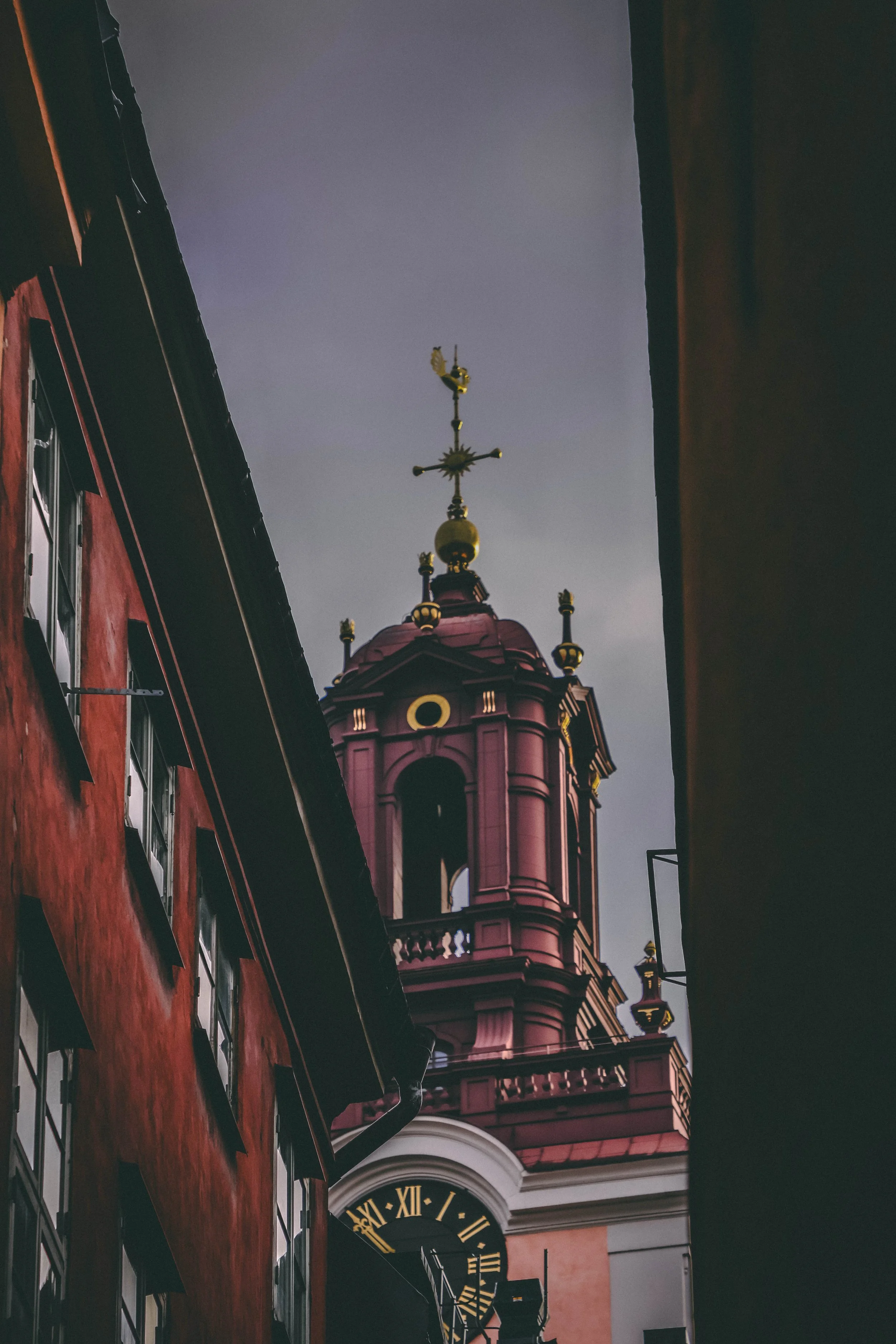
"The Clocktower’s Last Chime" In the heart of the old city, where the rooftops leaned like tired shoulders and the alleyways whispered secrets with every gust of wind, stood a crimson-and-gold clocktower. It had watched over Stockholm for centuries, its hands sweeping across time like a painter’s brush over canvas. Locals called it Tidens Väktare—The Keeper of Time. Every autumn, as the leaves turned to fire and the air grew sharp, the tower’s bell would chime with a peculiar echo. Not just a sound, but a feeling—like memory stirred from sleep. Inside the tower lived an old watchmaker named Isak. He was the last of his kind, tending to the gears and springs that kept the great clock alive. His fingers were stained with brass and oil, and his heart ticked in rhythm with the tower. Isak harbored a secret: the clock didn’t just measure time—it held it. Hidden behind the clock face was a chamber of forgotten hours. Time that had slipped through cracks: moments lost in grief, seconds stolen by hesitation, minutes buried in regret. Isak had spent his life collecting them, storing them like autumn leaves pressed in books. One October evening, as twilight painted the sky in bruised lavender, a young woman named Elin arrived. She had heard tales of the tower’s magic and came seeking a moment she had lost—a goodbye she never got to say. Isak led her to the chamber. There, among the swirling dust and ticking echoes, he found the hour she sought. He placed it in her palm like a fragile flame. “You may relive it,” he said, “but only once. Time is generous, but never greedy.” Elin closed her eyes, and the tower hummed. She saw her father again, standing beneath a golden tree, smiling with the warmth of a thousand autumns. She said goodbye, and this time, it was enough. Years passed. Isak grew older, and the tower quieter. One autumn, the bell rang a final time—twelve solemn chimes that echoed across the city like a heartbeat fading. Yet the tower remained, its hands still turning, its face still watching. Every autumn, when the wind is just right, you might hear a chime that doesn’t belong to any hour.

"The Lantern Keeper's Secret" On a cold, brisk autumn evening in the winding alleys of Gamla Stan, the cobblestones gleamed with recent rain and the scent of roasted chestnuts drifted from a nearby cart. The streetlamps flickered to life, casting golden halos on the damp stone, and the city exhaled a quiet hush as twilight settled in. At the bend of a narrow alley, where the buildings leaned close like old friends sharing secrets, lived an elderly man named Elias—the Lantern Keeper. Few knew his name, but everyone knew his light. Each evening, just before dusk, Elias would emerge from his crooked little house with a brass lantern in hand, lighting the lamps one by one, humming a tune no one could place. Children whispered that Elias was older than the city itself, that he’d once been a sailor, a poet, even a spy. But the truth was stranger still. One night, as the wind howled and leaves danced like spirits, Elias invited a curious boy named Linus into his home. The boy had followed him for weeks, fascinated by the ritual. Inside, the walls were lined with maps, clocks, and books bound in cracked leather. In the center of the room stood a lantern unlike any other—its flame shimmered blue and gold, pulsing like a heartbeat. “This,” Elias said, “is the Flame of Memory.” He explained that each lamp he lit with it didn’t just brighten the street—it awakened stories. The flame carried whispers of the past: lovers’ promises, soldiers’ farewells, bakers’ early mornings, and children’s laughter. Every night, Elias walked the alleyways not to chase away darkness, but to keep the city’s soul alive. Elias was old, and he knew his time was near. That night, he handed Linus the lantern. “You must listen,” he said. “Not just to the flame, but to the silence between the flickers. That’s where the stories live.” From that evening on, Linus became the new Lantern Keeper. And as the years passed, the alleyways remained aglow—not just with light, but with memory. On cold, brisk autumn evenings, if you walk quietly through the winding streets, you might hear a whisper in the wind: a tale of old, lit by a flame that never dies.

"The Cobbler's Autumn" In the heart of old Stockholm, tucked between amber-bricked buildings and beneath a canopy of golden leaves, lived a cobbler named Emil. His shop, Skomakeri Solsteg, was a narrow nook on a quiet alleyway, where the scent of leather mingled with the crisp autumn air. Emil wasn’t just a shoemaker—he was an artist of soles and stitches, crafting and repairing shoes for dancers, bakers, violinists, and wanderers alike. Each pair told a story. A scuffed boot whispered of mountain trails. A delicate heel hummed of candlelit galas. Emil loved imagining the lives behind the laces, but he never left his shop. He was content, or so he thought. One rainy October afternoon, while searching for a spool of thread in the basement—a place he rarely visited—Emil stumbled upon a peculiar sewing machine covered in dust and cobwebs. It was unlike any he’d seen: brass gears etched with runes, a needle that shimmered faintly, and a foot pedal shaped like a leaf. Curious, he cleaned it, oiled its joints, and placed a worn pair of ballet slippers beneath the needle. As he stitched, the machine pulsed with warmth. The moment he tied off the final thread, a strange sensation overtook him—his limbs lightened, his posture shifted, and suddenly, Emil was no longer Emil. He was her—the ballerina whose shoes he’d just repaired. He could feel the grace in his muscles, the rhythm in his breath, and the ache of years spent on tiptoe. The transformation lasted only a few hours, but it was enough to leave him breathless. Night after night, Emil stitched shoes with trembling hands. Each time, he became someone new: A pastry chef with flour-dusted dreams. A violinist whose fingers danced across strings. A child who ran through crunchy leaves with boundless joy. He began to understand people not just through their shoes, but through their steps, their burdens, their hopes. The machine didn’t just grant him transformation—it gave him empathy. The machine had shown him lives he’d never live. But it also reminded him of the beauty in his own: the quiet joy of crafting, the warmth of familiar streets, and the stories that walked in every day.
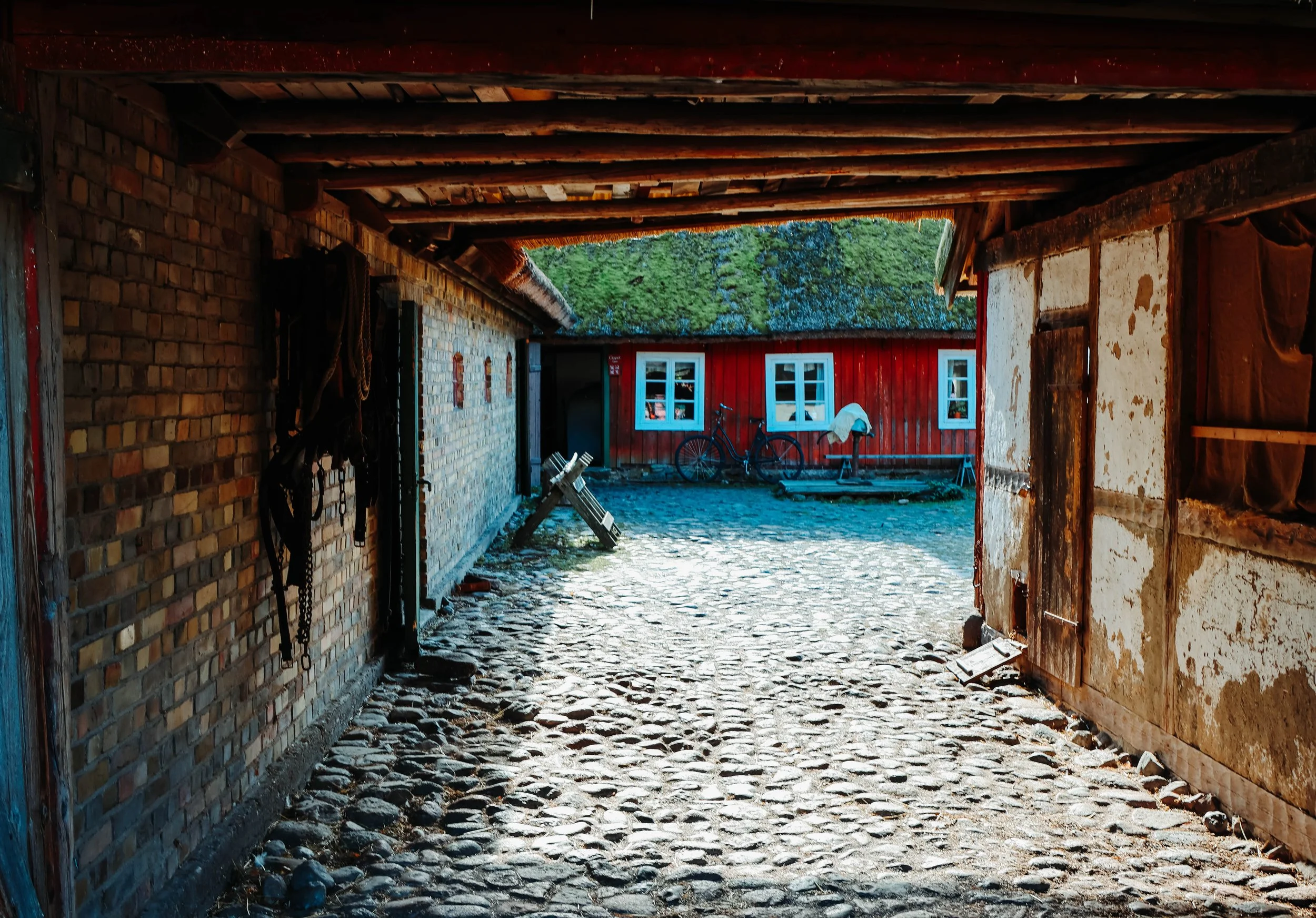
The Courtyard Keeper Noah ducked beneath the timbered archway, boots tapping softly on the cobblestones still damp from morning mist. The courtyard opened before him like a forgotten page—sunlight spilling across mossy rooftops, bicycles resting like loyal companions, and the scent of old wood mingling with autumn air. He came here every year, just as the leaves began to turn, to visit the red house tucked at the back. It belonged to his grandfather once—a blacksmith turned storyteller—who filled the walls with iron tools and tales of a time when the courtyard bustled with life. Now, the house stood quiet, but not empty. Inside, the hearth still worked, the kettle still whistled, and the wooden cart out front still carried the last of the season’s apples. Noah unpacked his satchel, placing a fresh journal on the table. This year, he would write the stories himself. Not just of the courtyard, but of the people who passed through it—the laughter, the labor, the love. As the sun dipped lower, casting long shadows across the stones, the courtyard seemed to lean in, ready to listen.

Autumn’s Embrace The morning air bit gently at the skin, crisp and clean, carrying the scent of damp earth and fading leaves. Sunlight filtered through the thinning canopy, casting golden flecks across the moss-covered roof of the little red cabin nestled at the edge of the woods. In the garden, dew clung to rows of potatoes, carrots, and late-season herbs—each one planted by hand, tended with care. The gravel path wound through the greenery like a quiet invitation, leading to the wooden porch where steam curled from the chimney, promising warmth within. Inside, the cabin glowed. A stew simmered slowly on the wood-burning stove, its rich aroma mingling with the scent of chopped rosemary and thyme. The fireplace crackled softly, its flames dancing against the stone hearth. A kettle hissed gently, steeping fresh mint and chamomile into a soothing brew. Noah stepped inside, cheeks flushed from the cold, boots dusted with soil. The warmth wrapped around him like an old friend. He paused, breathing in the layered comfort—stew, woodsmoke, herbs, and tea. It was the kind of moment that didn’t need words. Just the quiet rhythm of autumn, and the feeling of being exactly where he was meant to be.
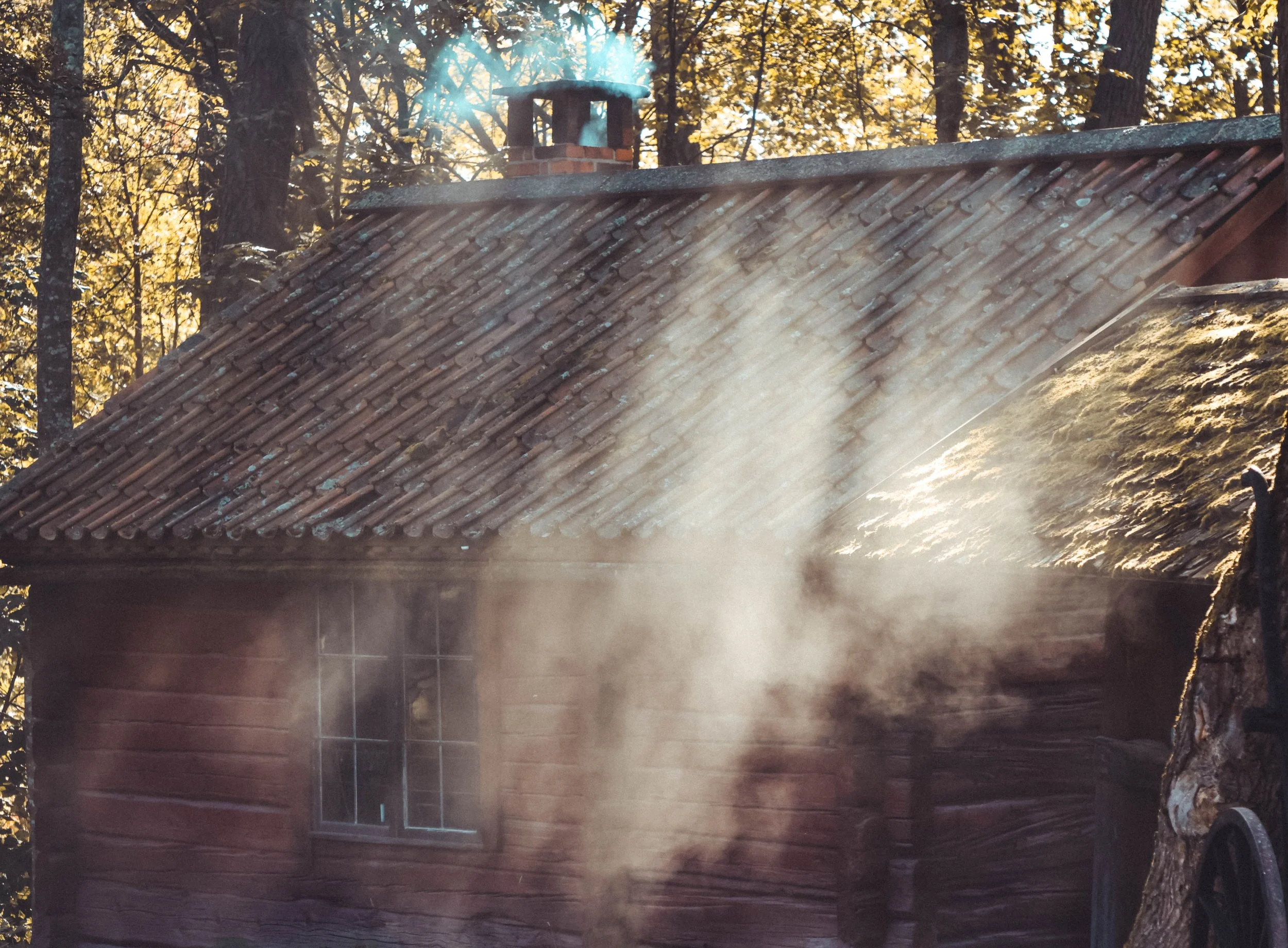
Where fire meets craft, and autumn wraps it all in gold. Nestled deep in the woods, the iron smith’s cabin breathes warmth into the crisp autumn air. Smoke curls from the chimney like a quiet signal—inside, the forge glows, the fireplace crackles, and iron takes shape beneath practiced hands. The forest hums with the season’s change, but here, time slows to the rhythm of hammer and flame.

Golden breath over a waking city. The first light of autumn spills across the rooftops, casting long shadows and warming the cool air with a soft amber glow. Church spires and towers stretch toward the sky, silhouetted against streaks of morning fire. The city is still—caught between sleep and stir—while the sun gently nudges it awake.

Painted facades and the hush of fall. The narrow street climbs gently, framed by buildings dressed in warm tones—orange, ochre, and faded blue—like autumn leaves frozen in time. The air is crisp, the light soft, and the city feels like it's holding its breath. A quiet moment where history and season meet, and every shuttered window seems to guard a secret.

A beacon in the hush of dawn. The street sleeps under a crisp autumn sky, its pastel walls still wrapped in dreams. But one entrance light glows softly—welcoming, watchful, perhaps waiting. It’s not just illumination; it’s a quiet invitation to wonder who passed through, who might return, and what stories linger behind that door.

Wrapped in fog and firelight. As dawn breaks over the chilled autumn harbor, the fishing vessel stands ready—its warm hues glowing against the crisp morning mist. The air bites gently, the water lies still, and the promise of the day’s first catch lingers in the quiet. A moment of calm before the rhythm of the sea begins.

The city stirs beneath a golden hush. Bathed in the soft glow of morning, the old skyline begins to wake—its spires and rooftops whispering secrets to the rising sun. Each stone and silhouette holds a story, silent yet profound, waiting to be heard by those who pause long enough to listen. A moment suspended between history and light.

Every doorway holds a whisper from the past. Tucked behind wrought iron and cobblestone, this quiet alleyway invites you into a world where architecture speaks and history lingers. The faded walls, the sunburst arch, and the name on the door—each element a chapter in the story of those who’ve passed through. A timeless corner where beauty and mystery meet.

Whispers of autumn in the air. A quiet Stockholm morning unfolds—cool, crisp, and serene. The historic facades glow softly in the early light, boats rest gently on the water, and the chill hints at fall’s arrival. Just you, the hush of the city, and the timeless beauty of old architecture waking slowly with the day.

“The Cabin Where Stories Live” As told by Merlin the Owl Em excuse… but if you’ve never spent an evening in a cabin deep in the woods, with a fire crackling and cinnamon steam curling from your mug, you’ve missed autumn’s true magic. I settled into my favorite chair, the kettle whistled, and soon my cup was filled with spiced tea that warmed my feathers and thoughts. The fire danced, tossing sparks like tiny fireflies, while outside the wind whispered secrets through the golden leaves. The cabin held stories in every creaky floorboard and whispered words from every worn book. A pumpkin blinked suspiciously from the windowsill—don’t trust it. Just then, my friend the robin arrived with roasted chestnuts and a caramel apple the size of a thimble. Together, we shared stories by firelight, the words swirling like smoke into the night. That, my friend, is how tales are best told—warm, shared, and a little mysterious.
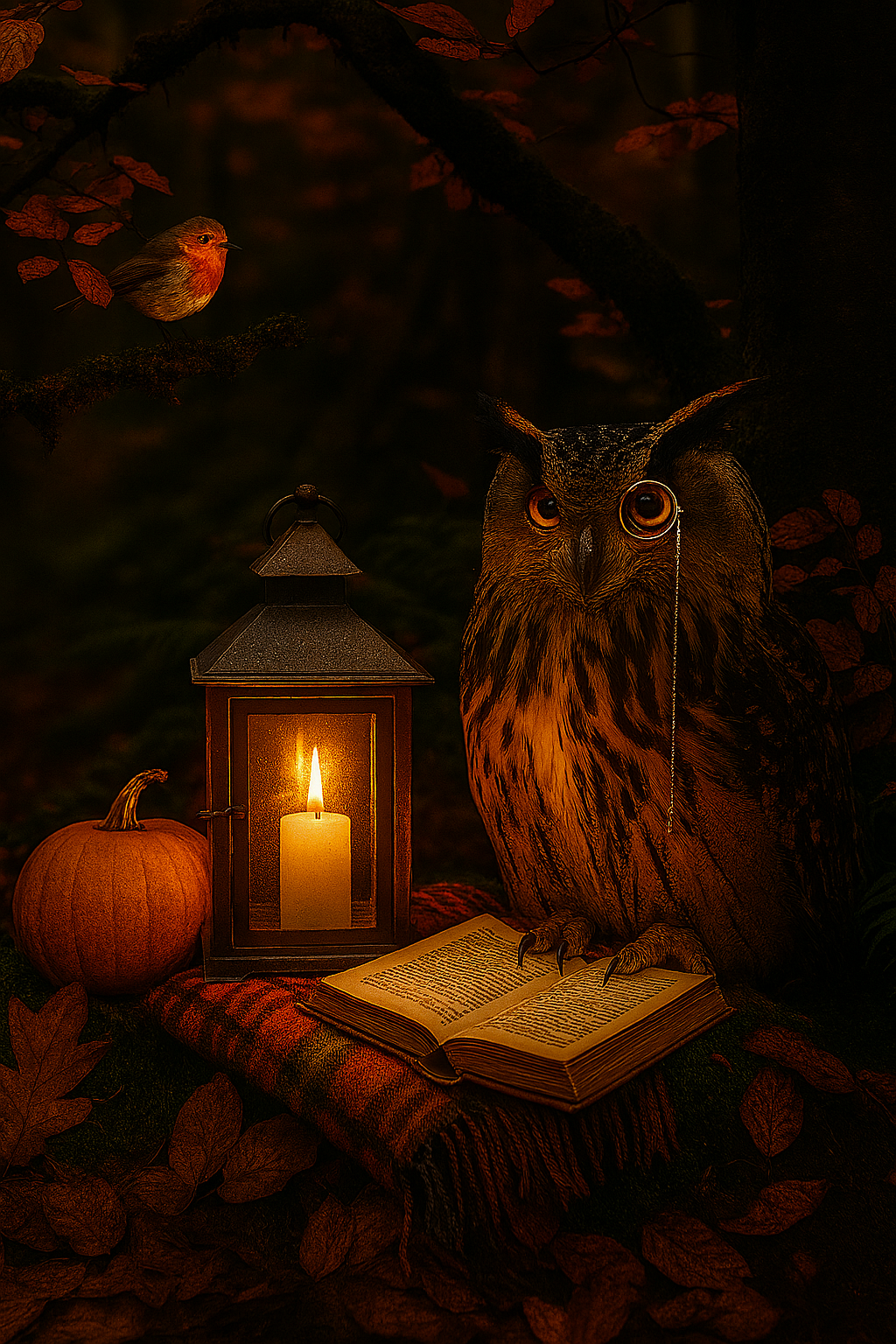
Merlin’s Lantern In a nook where twilight softly bends, where moss and memory intertwine, an owl named Merlin makes amends With time, and tea, and tales divine. His perch: a plaid and cushioned throne,A lantern warm, its golden glow spills secrets onto leaves full-grown,from whispered winds of long ago. A pumpkin rests with quiet pride, Its stem curled like a knowing grin, while ferns and oak leaves gently slide around the book he’s nestled in. The pages hum with ancient lore, of feathered kings and acorn spells, of robins guarding forest doors, and hedgehogs ringing leafy bells. A curious robin, wide of eye, peers down from branches overhead, as Merlin reads beneath the sky where stars prepare their nightly spread. The candle flickers, soft and slow, Its flame a dance of hush and gleam, and every word begins to glow like echoes from a woodland dream. No clocks, no rush, no worldly din, just stories steeped in cinnamon, where even pumpkins dare to grin and shadows pause to listen in. So if you find this forest bend, and hear a hoot, or catch a rhyme, you’ve met a friend who’ll gladly lend a tale or two to stretch through time.

“Em excuse…” Merlin the owl blinked at the pumpkin beside him. “Who invited this suspiciously plump squash? Is it decorative, or is it plotting something?” He sipped cinnamon tea from a thimble, perched on a plaid blanket so aggressively autumnal it made nearby leaves feel underdressed. His cushion read “HOOT HAPPENS.” His monocle gleamed. His patience did not. Suddenly, a duck in a scarf waddled aboard yelling, “I demand seasonal representation!” followed by a raccoon in a beret painting the sunset like it owed him money. Merlin sighed. “This was supposed to be a quiet evening. Now it’s a floating farmer’s market with delusions of grandeur.” Then the radio crackled: “Welcome to the Annual Autumnal Boat-Off! Winner gets eternal bragging rights and decorative gourds!” Merlin flared his wings. “Activate Cozy Overload.” He conjured a leaf canopy, a glowing hedgehog lantern, and a smug floating pie. The duck fainted. The raccoon wept. A squirrel screamed, “HE’S DONE IT AGAIN!” Merlin leaned back, talons crossed. “Em excuse,” he whispered, “but I believe I just won autumn.” The pumpkin blinked. Merlin blinked back. “…We’ll deal with that tomorrow.”

Ah, there you are… I was wondering when you'd return. The stones beneath my talons are cool now, kissed by the fading warmth of the sun. Each one has a story, you know—smoothed by time, shaped by tide, and whispered to by the wind. I’ve perched here for centuries, watching the seasons turn like pages in a well-loved book. And autumn, dear friend, is my favorite chapter. The forest behind us glows in copper and flame, its leaves fluttering like old secrets let loose. The ocean ahead stretches wide and wise, its surface shimmering with the last light of day. Between them lies this shore—a quiet meeting place where land and sea exchange tales, and everything feels stitched together by something ancient and kind. Boats bob gently at the dock, their ropes creaking like lullabies. The grasses sway, golden and soft, and the rocks—ah, the rocks—form a path that leads not just to the water, but to wonder. If you listen closely, you might hear the sea hum a tune older than memory. This place is no accident. It’s a tapestry woven from driftwood and dreams, from salt and song. And you, standing here now, are part of it. You belong to this moment, just as the breeze belongs to the trees and the fire-colored sky belongs to the dusk. So stay a while. Let the quiet wrap around you like a woolen cloak. Let the stories rise from the stones and settle in your heart. The world may be vast and wild, but here—right here—it all comes together. I, Merlin the Owl, will keep watch. As the golden light fades and the stones cool beneath the hush of twilight, the shore holds its breath in quiet harmony. Everything—forest, sea, sky, and story—comes together in a moment that feels both timeless and tender, like nature itself is exhaling peace.

Dear Reader, There are places in this world that seem stitched together from the threads of quiet dreams and golden memories. This is one of them. Nestled at the edge of the Baltic Sea, where the forest leans in close and the wind carries the scent of salt and pine, stands a humble red sauna hut. Its wooden walls, weathered by seasons and stories, glow softly in the amber light of fall. Inside, the wood-burning stove crackles with warmth, fed by logs gathered from the surrounding forest—each one a gift from nature, each flame a whisper of comfort. Through the large window, the ocean stretches wide and still, its surface kissed by the last light of day. The leaves outside rustle in copper and gold, and the air is crisp with the promise of evening. Here, time slows. Here, the world feels gentle. And so, dear reader, let us step inside. Let us breathe in the warmth, listen to the hush of the waves, and begin a story that unfolds like steam rising from the stones—soft, slow, and full of heart. As the evening deepens and the last embers settle into a quiet glow, the red sauna hut becomes more than just shelter—it becomes a sanctuary. In its warmth, we are reminded that simplicity holds power. That the hush of the forest, the rhythm of the waves, and the scent of burning wood can speak louder than words. In a world that often rushes forward, this place invites us to pause. To breathe. To remember that peace isn’t something we chase—it’s something we choose. So, dear reader, may you carry a little of this stillness with you. Like the warmth of the sauna lingering on your skin, long after you’ve stepped back into the cool autumn air.
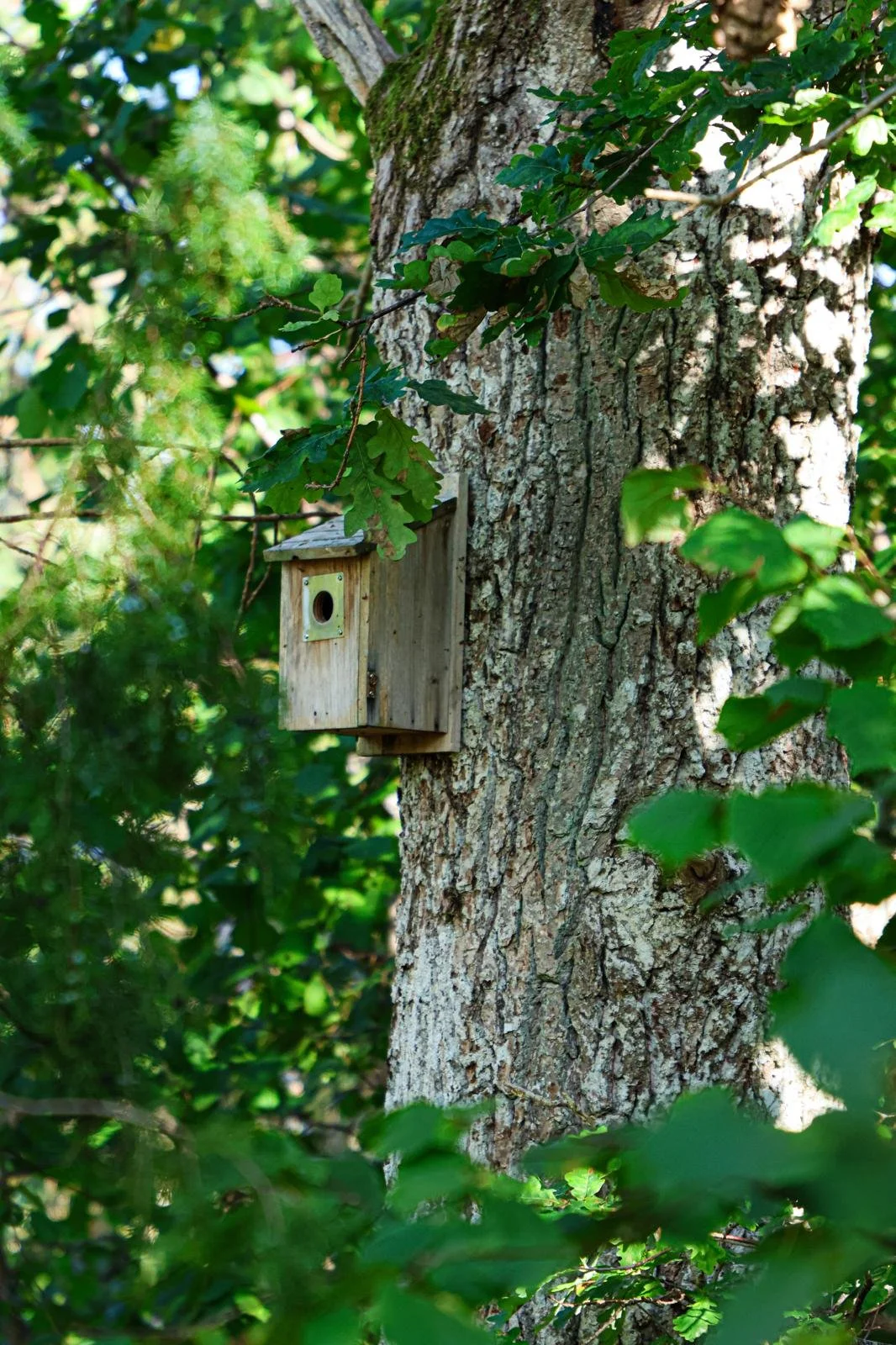
The Hearth of Hazelwing Hollow Dear reader, Tucked deep within the whispering woods of Hazelwing Hollow, nestled against the bark of an ancient oak, stood a tiny wooden cottage no taller than a squirrel’s dreams. To most passersby, it was merely a birdhouse—but to its resident, a plump little wren named Wimbly, it was home. Inside, the air was thick with the scent of simmering acorn stew, bubbling gently on a miniature iron stove. A kettle sang softly beside it, puffing out curls of steam that danced in the golden light. The fireplace crackled with warmth, its flames casting flickering shadows on the pinewood walls, where tiny portraits of feathered ancestors hung in walnut-shell frames. Wimbly sat in a rocking chair carved from driftwood, a half-knitted scarf trailing from her tiny claws. The yarn—dyed with crushed berries and moss—was a gift from the chipmunks last winter. Her spectacles perched delicately on her beak as she hummed a tune older than the trees themselves. Outside, the wind rustled the leaves like a lullaby, but inside, all was still. Cozy. Timeless. So the day passed, stitch by stitch, stew by sip, in the quiet joy of a life well-feathered.

Dear reader, If your path ever leads you to the shadowed veins of old Vinterholm, you may stumble upon a narrow alley where the buildings lean close, as if conspiring. This is no ordinary passage—it is the Alley of the Crossed Wall, a place where time folds and stories breathe. Long ago, a solitary watchman known only as The Lantern Keeper walked this alley each night, lighting lamps with a flame that never flickered. He vanished one stormy evening, leaving behind only the mark—an “X” etched into the wall where he was last seen. Since then, the mark has remained untouched, a silent sentinel to a mystery unsolved. Some say the Keeper was no man at all, but a guardian of forgotten memories. Others believe the “X” is a portal, visible only to those burdened by truths too heavy for daylight. Travelers have claimed to hear footsteps that do not echo, or see windows reflecting scenes from centuries past. The buildings, they say, do not lean from age—but from listening. So tread lightly, dear reader. The lamps still burn, the walls still whisper, and the mark still waits. For in Vinterholm, legends are not erased—they are inherited.

Dear reader, October is coming, and with it, the hush of fallen leaves and the stir of something unseen. The Royal Palace looms over Stockholm like a sentinel of forgotten time—its windows watching, its silence too deep. Beneath the blood moon’s eerie glow, the air thickens with whispers from the other side. Long before the palace stood in stately grandeur, an ancient manor occupied this ground. One stormy night, it vanished without a trace—no rubble, no survivors, just a scorched patch of earth and a lingering chill that never left. They say the palace was built atop that cursed soil, and with it came The Watcher. Cloaked in silver mist, he walks the grand staircase when the skies turn heavy and the flag flutters without wind. Some believe he was a royal guard lost in the manor’s final night, still bound to protect a crown that no longer exists. Others whisper of a child’s laughter echoing from sealed rooms, of doors that open to nowhere, and of cold hands brushing past in empty corridors. If you pass by on such a night, don’t linger. And if you hear your name whispered from the shadows… run. Some spirits don’t want to be remembered—they want company.

Dear reader, October is coming, and with it, the hush of fallen leaves and the stir of something unseen. Beneath the blood moon’s eerie glow, the air thickens with whispers from the other side. Ghosts—gentle and grim—begin to drift through the veil, drawn by candlelight and memory. They linger in doorways, peer through frosted windows, and hum lullabies no living soul remembers. This is the season of shadows and stories, of pumpkins grinning in the dark and footsteps that echo without a source. Halloween approaches, and the night grows bold. Keep your lantern lit and your heart steady. The spirits are watching—and some just want to be remembered.

"Watch out, my little curious reader… this alleyway is no ordinary path. It’s a trap woven from whispers and cobblestones, where time folds in on itself and footsteps vanish mid-stride. They say the bicycle left against the wall belonged to a messenger who never returned — and that the archway above marks the threshold between memory and myth. Beware the hauntings, for they don’t scream… they beckon. And once you’ve entered, the street may decide it likes you too much to let you leave."
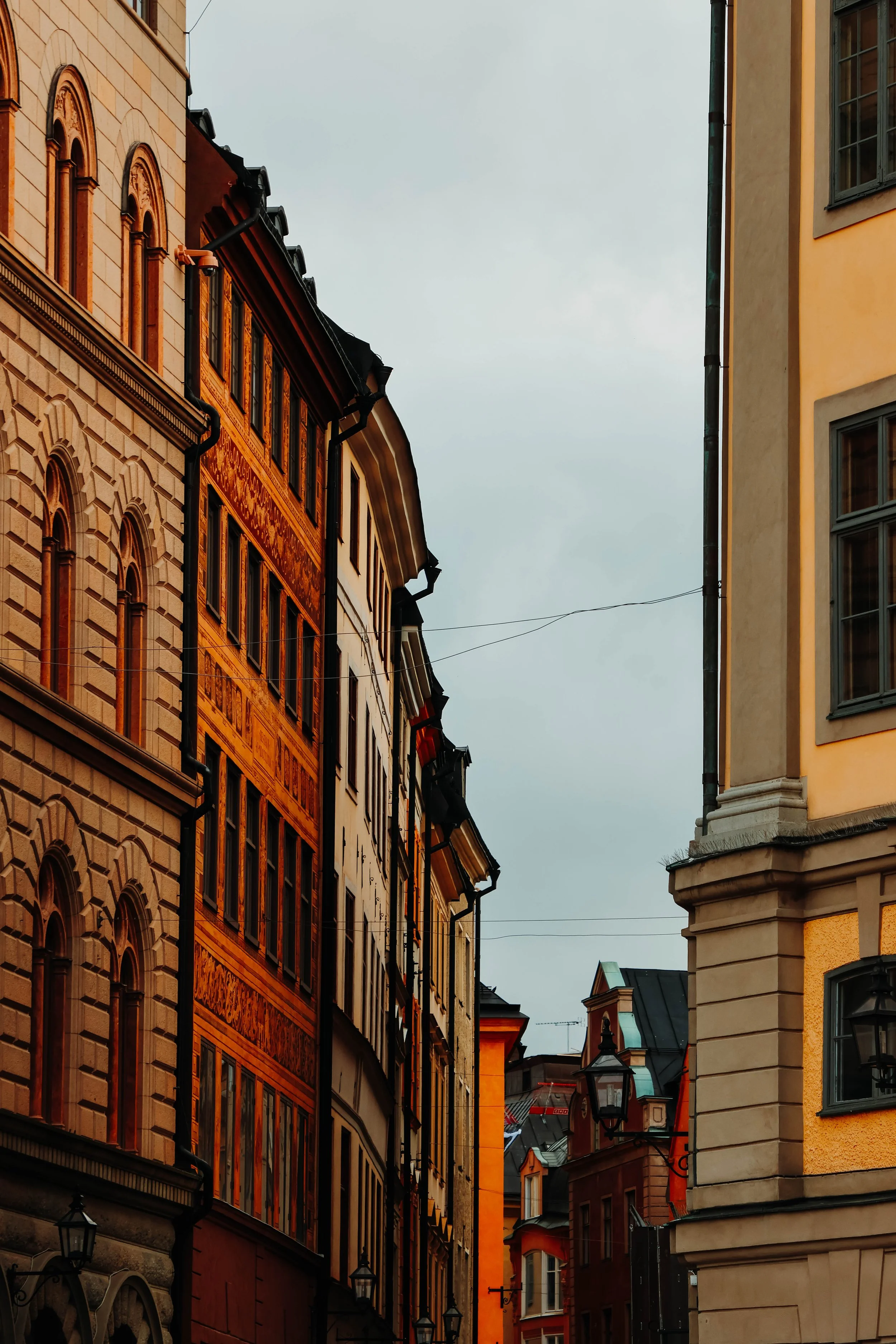
"Don’t wander off, dear reader… this street has a habit of keeping those who stray. Beneath its warm façades and crooked windows lies a tale older than the bricks themselves. They say the ochre house once belonged to a cartographer who mapped dreams instead of lands — and vanished after charting a door that never existed. The air still hums with his ink. Every shuttered window hides a century, every stone remembers a name. Walk gently, for history here is not written — it watches."
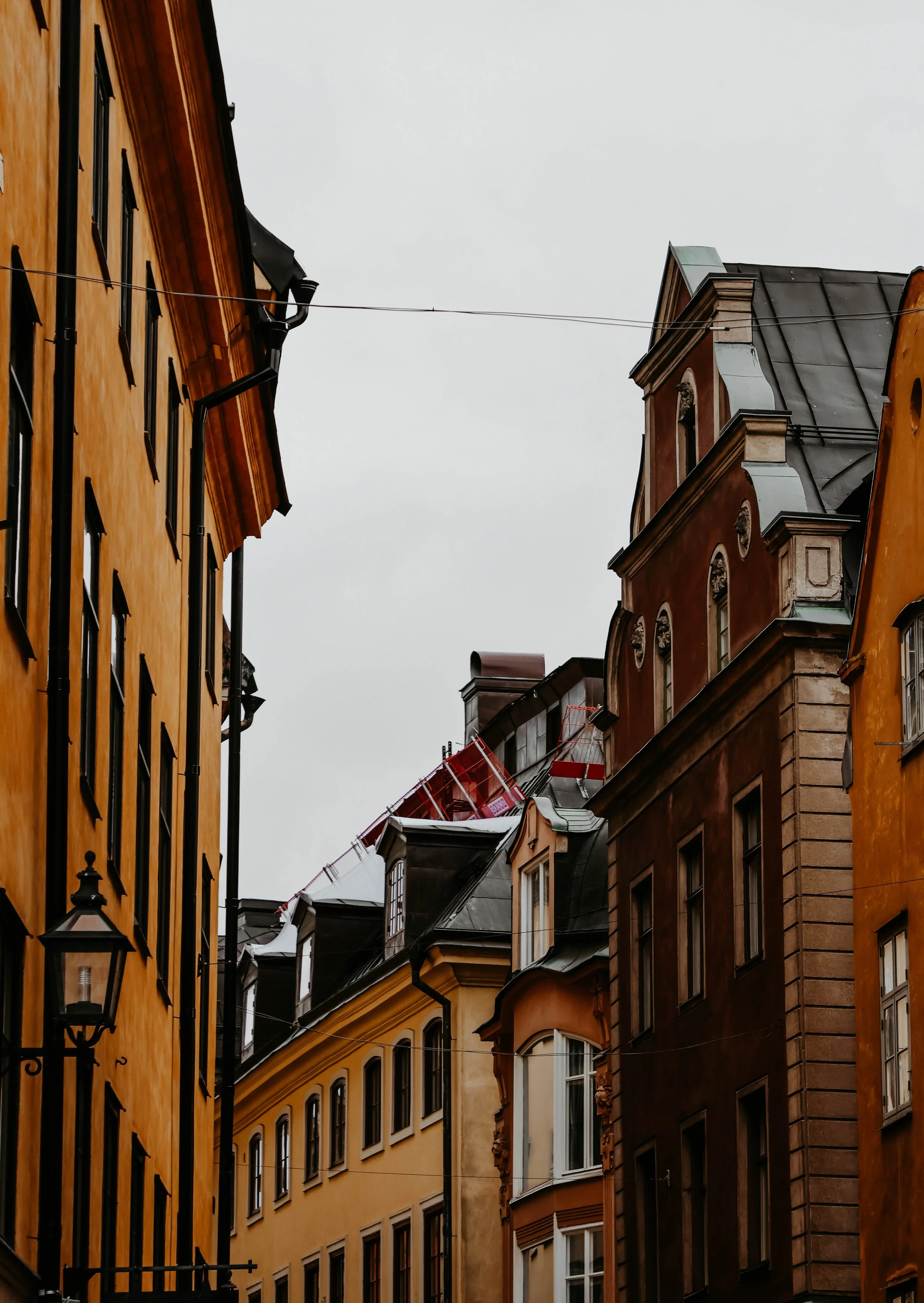
"You’ve returned. Of course you have. This street doesn’t forget its visitors — it waits. The buildings lean close not to whisper, but to listen. Locals say the red-roofed house belonged to the Skymningsväktare, the Twilight Watcher, who vanished one stormy dusk, leaving only a trail of ash and a door that never stays shut. They say if you walk too slowly, the windows blink back — and if you walk too fast, the cobblestones shift to keep you here. Don’t look up. The sky’s been watching since before you were born."

"There you are, dear traveller. Been looking for you. Come, tiptoe with me down this narrow, sleepy street where the lanterns flicker like secrets and the cobblestones remember every footstep. The air hums with forgotten lullabies, and if you listen closely, the walls might whisper your name. Don’t worry the ghosts here are friendly, mostly."

September 1st, 1944 Somewhere in France My Dearest Eleanor, Tonight, the stars above this foreign sky burn a little brighter, and I swear they’re whispering your name. I sit here with a borrowed pen and a heart full of you—your laughter, your letters, the way you always tucked your hair behind your ear when you were nervous. I carry those moments like medals, more precious than any I could earn out here. The days are long, and the nights longer still. The sound of boots on gravel, the distant hum of engines, the quiet prayers of men who miss their homes—it all blends into a rhythm I’ve grown used to. But nothing, not even the roar of artillery, drowns out the memory of your voice. I hear it in the wind, soft and steady, reminding me why I fight and what I long to return to. I dream of the porch swing, of your hand in mine, of Sunday mornings with coffee and no need to rush. I dream of growing old with you, of building a life that’s stitched together with laughter and quiet grace. War teaches a man what truly matters, and for me, it’s you. It’s always been you. I don’t know when I’ll be able to send this, or when you’ll read it. But know this: every beat of my heart is a step closer to home. And when I do return, I’ll hold you like the world’s been waiting for us to begin again. Until then, keep the light in the window burning. I’ll follow it home. Yours always, James
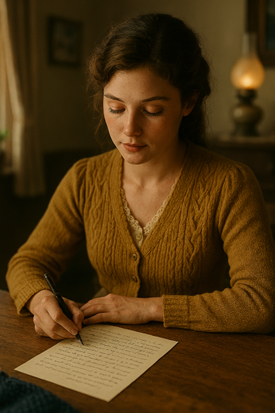
October 3rd, 1944 Maple Hollow, Pennsylvania My Darling James, I read your letter beneath the old oak tree where we carved our initials that summer before you left. The leaves are turning now—burnt orange and gold—and the wind carries your words like a whisper through the branches. I held the paper to my chest and closed my eyes, imagining your heartbeat beneath mine. I miss you in ways I never knew were possible. The house is quieter without your laughter echoing down the hallway. I still make coffee for two each morning, just in case you find your way home before the sun rises. Mama says I should stop, but I can’t. It’s my way of keeping hope alive. Your words—oh, James—they wrap around me like a warm blanket. I read them aloud sometimes, just to hear your voice in the room. I picture you beneath foreign stars, brave and steady, and I pray they guide you safely back to me. I’ve started knitting again. A scarf, this time. Deep navy blue, like your eyes when you’re thinking hard. I’ll send it with my next letter, so you can carry a piece of me with you. Maybe it’ll keep you warm when the nights grow cold. I believe in you. In us. In the life we’ll build when this war is just a story we tell our grandchildren. Until then, I’ll keep the porch light on and your place at the table set. Come home to me, my love. Forever yours, Eleanor
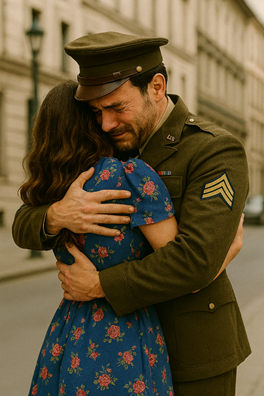
As the city hummed quietly around them, time seemed to pause. James, fresh from the front lines, held Eleanor as if letting go would undo the miracle of their reunion. Her dress fluttered gently in the breeze, a burst of color against his worn uniform. In that embrace, the weight of distance, longing, and silent prayers melted away—replaced by the simple, overwhelming truth: they were finally home in each other’s arms.

A Letter from Finn the Cricket Found tucked beneath a smooth stone near the lake’s edge Long ago, when the reeds were green and the wind played soft tunes across the water, I was just a young cricket with a fiddle carved from birch bark and a heart full of rhythm. I lived beneath the floorboards of the old building by the lake—the one with the tall spire that touched the sky like a question. The humans called it the Hall, but to me, it was a concert hall of creaks and echoes. Every evening, I’d perch near the windowsill and play my song as the sun dipped low and the lake turned to glass. Autumn was always my favorite. The air grew crisp, and the trees along the shore dressed themselves in gold and rust. The reeds swayed like dancers, and the lake whispered secrets only the wind could understand. I’d watch the clouds roll in, soft and heavy, and feel the world slow down—like it was savoring each breath. I remember one fall in particular. The lake was still, the sky a blanket of silver, and I met Mara, a lady cricket with wings that shimmered like frost. She’d just arrived from the orchard beyond the hill, and her chirp was so sweet it made the ducks pause mid-quack. We spent that season tucked beneath the roots of an old oak, sipping dew from acorn caps and composing songs that made the squirrels cry (in a good way). We danced on mushroom tops and watched the moon ripple across the lake like a lullaby. But seasons change. Mara flew south when the frost came, chasing warmer winds. I stayed behind, my fiddle tucked close, my memories stitched into every note. Now, I’m older. My legs creak more than my strings, and my chirp has a wobble. But I still come to the lake each fall. I sit among the reeds, watching the spire reflect in the water, and I play our song. The ducks still pause. The wind still listens. So if you find this letter, tucked beneath the stone, know this: Life is a melody. Play it with joy. Sing it with love. And when the leaves fall, remember the dance. Yours in rhythm and memory, Finn the Cricket

“Once Upon a Time in Bellmare” Once upon a time, nestled between the sea and the green hills, there was a village so lovely that even the breeze seemed to pause and sigh. Its name was Bellmare, and it was known for its cobblestone streets, cheerful shops, and the smell of fresh bread drifting through the air. The houses were built from stone and wood, with painted shutters and flower boxes overflowing with daisies and thyme. The streets were lined with cozy cafés, colorful storefronts, and the sound of laughter echoing from every corner. At the center of town stood the bell tower, tall and graceful, its bronze bell ringing each morning like a gentle wake-up call. It was the heart of Bellmare, and everyone believed it had a little magic in it. Down by the harbor, the fish market came alive with the day’s catch. Fishermen like Tom, with his wool cap and sea-weathered hands, hauled in crates of salmon, cod, shrimp, and lobster. He always saved the best lobster for the village bakery, saying, “Only Nora knows how to turn this into something special.” The bakery sat on the corner of Clover Lane, its windows glowing with warmth. Inside, the air was rich with the scent of sourdough, cinnamon, and rosemary. Nora, the baker, greeted everyone with a hug and a smile. Her cheeks were always dusted with flour, and her laugh could warm even the coldest morning. Across the square, the farmers’ market bloomed with color. Farmers like Mae, with her baskets of strawberries and fresh eggs, arranged her produce like art. There were carrots tied in bunches, jars of golden honey, and bundles of mint that made the whole market smell like summer. And it was in this village, on a morning stitched with sunlight and sea breeze, that our story truly begins. The Girl with the Flour-Dusted Heart Ella, Nora’s niece, was seventeen and full of quiet wonder. Her hair curled like wild vines, and her eyes held the color of stormy skies. She lived above the bakery and spent her days kneading dough and dreaming of stories. But lately, Ella felt a tug in her heart—a longing for something more, something she couldn’t name. One morning, while delivering rosemary rolls to the market, she saw him. Jack. He stood by the tomato stall, sketching the bell tower in a notebook. His hair was messy, his sleeves rolled up, and his smile—when he saw her—was like the first bite of warm bread. They talked. About bread. About bells. About how the sea smelled different in the morning. Jack was an artist from the city, visiting Bellmare to find inspiration. But what he found was Ella. Days passed like petals falling. They wandered the cobblestone streets, shared shrimp pies by the harbor, and danced to the bell tower’s chime. Ella showed him how to fold croissant dough, and Jack taught her how to see stories in shadows. As all stories go, the clouds eventually rolled in. Jack had to return to the city. His train ticket was tucked in his coat, and the goodbye hung in the air like unsaid words. On his last morning, Ella baked. She mixed flour and salt, water and yeast, but this time, she added something new: lavender from the windowsill, lemon zest from Mae’s stall, and a pinch of hope. She shaped the dough into a heart, brushed it with honey, and tucked a note inside: “Come back when the bell sings your name.” She handed it to him at the station, her hands trembling, her smile brave. The Bell That Waited, Seasons passed the fish market changed with the tides. The bakery grew busier. Ella baked and waited, her heart rising and falling like dough. Then, one spring morning, the bell tower rang differently. It was louder. Brighter. Like it was laughing. Ella stepped outside, flour on her apron, and saw him. Jack, standing in the square, holding a sketchbook and a heart-shaped loaf—now golden and perfect. “I heard it,” he said. “It sang your name.”They ran to each other, laughter spilling like sugar. The village watched, smiling, as the bell chimed again—once, twice, three times. From that day on, Bellmare had a new story. Of a girl who baked love into bread. Of a boy who found art in a village. Of a bell that remembered. Ella and Jack opened a little café beside the bakery, where art and pastries danced together. The walls were lined with sketches, the tables with sourdough hearts. Children came for the cookies, elders for the stories, and travelers for the warmth. And every morning, as the sun kissed the cobblestones and the sea whispered to the shore, the bell tower rang. Once for the bread. Twice for the love. And a third time—for the magic that lives in places like Bellmare. The End.
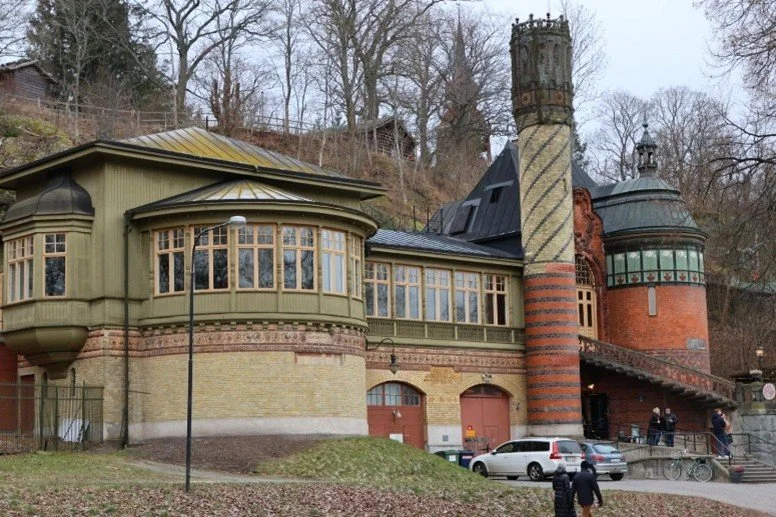
“Pip and the Perfumed Wind” My name is Pip. I’m a mouse—small in stature, mighty in nose—and I work in the old flower mill nestled between a grove of whispering trees and the most enchanting bakery this side of the river. The mill is ancient. Its wooden beams groan like sleepy giants, and the gears turn with the rhythm of a lullaby. I live in a hollowed-out knot in the main beam, lined with rose petals and a thimble mattress stuffed with dandelion fluff. Every morning, before the sun stretches its golden arms across the sky, I scurry up the flour chute and release the first scoop. It falls like snow—soft, warm, and fragrant with the memory of sunlit fields. The air inside the mill is a symphony of scent: toasted grain, aged wood, and the faint perfume of the lavender sachet I keep tucked under my pillow. But the real magic begins when the bakery next door stirs to life. It starts with a whisper—Madame Eloise’s footsteps on the stone floor, the clink of copper pans, the sigh of the oven waking from its slumber. Then comes the butter. Oh, the butter. Melted slowly, it sends out golden notes that wrap around my whiskers like a lullaby. Sugar follows, crackling and caramelizing, singing as it dances with cinnamon and nutmeg. I peek through the knot in the wall and watch her work. Madame Eloise is a magician in an apron. Her hands move with grace and purpose, kneading dough like she’s coaxing secrets from the flour. Her cheeks are always dusted with white, and her hair is pinned up with a wooden spoon. She hums as she bakes—sometimes opera, sometimes jazz, sometimes a tune that sounds like sunshine. Today, she’s making honey-cardamom rolls. I know because the scent hits me like a warm hug from a cinnamon bear. The cardamom is sharp and citrusy, like a flirtatious breeze. The honey is deep and golden, like sunlight trapped in syrup. She folds the dough gently, tucks it into pans, and lets it rise like a secret waiting to be told. Outside, the trees sway in rhythm, their bare branches tapping against the windows like impatient guests. Children laugh in the distance, pigeons coo from the rooftops, and the wind carries the scent of baking bread like a love letter to the whole neighborhood. I sprinkle a pinch of my finest flour near the bakery’s vent—a silent hello. She always smiles when she sees it, though she pretends not to know where it comes from. It’s our little ritual. By noon, the whole street smells like a memory. Warmth radiates from the bakery like a heartbeat, and I sit on my flour sack throne, paws dusted white, heart full, nose twitching with joy. Because in this little corner of the world, where flour floats like snow and bread sings in the oven, I am not just a mouse. I am a keeper of scent. A witness to warmth. A tiny soul in a big, beautiful recipe. Every day, I fall in love with the perfumed wind all over again.

“Where the Street Remembers Us” The narrow street hadn’t changed. The buildings still wore their warm coats of red and ochre, the cobblestones still whispered underfoot, and the grand spire in the distance still pointed toward the sky like a memory trying to be remembered. Clara stood at the edge of the alley, her fingers wrapped around a coffee cup she hadn’t touched. She hadn’t meant to walk this way. Her feet had simply taken her—like they remembered something her heart hadn’t dared to. And then, as if the city had been holding its breath for years, Jonas turned the corner. He looked older. So did she. But the way his eyes lit up when they met hers—that hadn’t aged a day. They stopped. No words. Just the kind of silence that feels like a hug. “I thought you moved to Berlin,” Clara said, finally. “I did,” Jonas replied. “But I kept dreaming of this street. Of you. Of us.” She smiled, the kind that starts slow and ends in a thousand heartbeats. “I still come here sometimes. I guess I hoped the street would remember us.” Jonas stepped closer. “It did.” They walked together, past the windows that once reflected their laughter, past the café where they’d shared croissants and secrets, past the spot where he’d first kissed her—awkwardly, beautifully, like he was afraid she’d vanish. And in that moment, nothing had changed. Not the buildings. Not the sky. Not the feeling. They didn’t talk about the years apart. They didn’t need to. Because love, real love, doesn’t keep time. It just waits. “Found Again” We met where the buildings lean in close, like old friends whispering secrets. The street remembered us— even when we forgot ourselves. Years folded like napkins in drawers, creased with silence, stained with longing. But you smiled, and time forgave us. No clocks ticked when you spoke my name. No past mattered when our hands brushed. Love, it seems, doesn’t keep score— it just waits. So if someone finds this napkin, let them know: two hearts once lost found their way back on a street that never stopped believing.

The cobblestone alley glowed in the late afternoon light, warm as a fresh croissant. The buildings—painted in shades of marmalade and mustard—leaned in like nosy aunties, watching the drama unfold below. Across the water, the amusement park spun and twinkled, like a disco ball for emotionally unstable seagulls. Duchess, a pristine white cat with a pearl collar and a walk that screamed “I once modeled for a luxury tuna brand,” tiptoed down the alley. She was elegance incarnate, with fur so soft it made clouds jealous and a gaze that could curdle milk—or melt hearts. She was not supposed to be here. Her human was hosting a garden party with cucumber sandwiches and jazz flute. But Duchess had slipped out—drawn by something far more intoxicating than hors d'oeuvres: the sound of a raspy feline voice singing “Meow Me a River” from a rooftop. Here comes Thomas O’Malley, the alley cat with a crooked grin and fur that looked like it had survived three thunderstorms and a paintball war. He was lounging on a windowsill, strumming a ukulele made from a shoebox and dental floss. “Back again, Duchess?” he purred, tail flicking like a metronome. “I was in the mood for something... less beige,” she replied, hopping up beside him. “Besides, your singing makes my whiskers tingle.” Thomas winked. “That’s either love or mild electrocution.” They watched the swing ride spin across the water, its lights flickering like fireflies on espresso. Below, the alley was quiet—just the two of them, a half-eaten meatball someone had dropped, and the scent of cinnamon waffles drifting from a nearby café. “I brought you something,” Duchess said, pulling a velvet pouch from under her collar. Inside: a single sardine, wrapped in gold foil. Thomas gasped. “Is this... royal fish?” “Imported from Monaco,” she said. “It’s aged. Like cheese. Or your jokes.” They shared the sardine like a couple in a rom-com montage, nibbling and giggling and accidentally knocking over a flowerpot (which they blamed on a passing pigeon named Lars). As the sun dipped low and the amusement park lights blinked on like stars with ADHD, Thomas leaned in. “You know, Duchess... you take the silk, I take the street—but together, we make the city purr.” Duchess smiled, her eyes twinkling. “You’re ridiculous.” “And you’re perfect.”They curled up on the windowsill, tails entwined, hearts full, and stomachs slightly upset from the sardine. as the stars blinked above and the moon cast its silver spell over the city... they purred happily ever after. That’s all, folks!

“Whiskers Malone and the Case of the Vanishing Violin” The morning mist clung to the cobblestones like secrets. Flags fluttered overhead, gossiping in the breeze. And there, perched on a wrought iron lantern like he owned the whole block, was Whiskers Malone, the alley bard himself. He squinted down the empty street, his fedora tilted just so. "Something’s off," he muttered. "Too quiet. Even the pigeons are holding their breath." Just then, a frantic figure burst from a doorway—a squirrel in a velvet waistcoat, clutching a monocle. "Whiskers! It’s gone! The maestro’s violin—it vanished!" Whiskers leapt down with the grace of a caffeinated ballerina. "A missing instrument? In this part of town? Sounds like a job for me and my questionable ethics." He sniffed the air. Mulled wine. Old wood. And… peanut butter? They followed the scent trail past shuttered cafés and sleepy balconies until they reached a suspiciously ornate trash bin. Whiskers tapped it twice. It opened with a creak. Inside sat Professor Rascal von Dumpsterstein, raccoon rogue and part-time opera critic. "Looking for this?" Rascal held up the violin, now strung with spaghetti. "Why?" Whiskers asked, blinking slowly. "I was trying to play ‘Ode to Pasta’," Rascal said. "But the strings snapped. So I improvised." Whiskers sighed. "You can’t just noodle a Stradivarius, Rascal." They returned the violin to the maestro (after removing a meatball), and the squirrel wept with gratitude. As the sun peeked over the rooftops, Whiskers Malone climbed back onto his lantern perch, tail flicking in rhythm. "Another mystery solved. Another snack denied. Curse you, gluten." Somewhere down the street, a pigeon applauded.

“The Great Salt Lick Heist” It was a peaceful morning in the zoo enclosure. Birds chirped. Mulch mulched. And two moose lounged like retired rock stars. Sir Snuffleton McThistle adjusted his antlers with regal flair. “Reginald, I had a dream last night. I was a chandelier in a forest ballroom. The squirrels applauded.” Lord Reginald Antlerbottom III blinked slowly. “I once dreamed I was a sentient coat rack. A raccoon hung his laundry on me and whispered secrets.” Today was no time for dreams. Today… was Salt Lick Day. Every Saturday, the zookeeper wheeled out a glorious, glistening block of salt. It was the moose equivalent of a Michelin-starred buffet. But this time, something was wrong. Sir Snuffleton gasped.“Reginald… the salt lick… it’s gone.” Lord Antlerbottom narrowed his eyes. “This is a crime against moosekind. We must investigate.” They trotted (well, waddled) toward the scene. Clues were everywhere: raccoon paw prints, a trail of glitter, and a suspicious note that read: “If you want your salty treasure back, meet me by the flamingo pond at noon. Come alone. Bring snacks.” Professor Rascal von Dumpsterstein Sir Snuffleton growled. “That trash panda’s gone too far.” Lord Antlerbottom nodded. “Time to activate Moose Protocol.” They donned disguises—Snuffleton wore a fake mustache made of twigs, Reginald wore sunglasses he found in the lost-and-found bin. They approached the flamingo pond with stealth and dignity (and a backpack full of granola bars). Professor Rascal emerged from the bushes wearing a cape made of banana peels. “You’re late. And you brought snacks. Good. Now hand them over.” Sir Snuffleton stepped forward. “Return the salt lick, Rascal. Or we’ll antler you into next Tuesday.” Professor Rascal cackled. “You fools! I’ve already licked it! It’s flavorless now! Mwahaha!” A dramatic silence fell. Lord Antlerbottom sighed. “Then we have no choice. We’ll have to lick the backup block.” Sir Snuffleton gasped.“You mean… the one hidden beneath the mulch?” They dug furiously. Mulch flew. Flamingos scattered. And at last—they unearthed the Emergency Salt Lick, glistening like a mineral miracle. They licked. They wept. They forgave Rascal (after he agreed to do their laundry for a month). As the sun set, the two moose lay side by side once more. Sir Snuffleton: “Reginald… we are legends.” Lord Antlerbottom: “Indeed. Salted, satisfied, and slightly ridiculous.”

“Abigail Featherstone: Memoirs of a Goose with Standards” As narrated by Abigail herself Darling, I simply must speak my truth. I am Abigail Featherstone, heiress to the Featherstone Pond Estate, third in line to the Royal Bread Crust Reserve, and the only goose in the park with a personal stylist (he’s a squirrel named Maurice, but he’s fabulous with moss). This morning was ghastly. I awoke to find my pond water had not been infused with cucumber. Again. I honked thrice for the butler—nothing. I had to flap my own wings to summon him. Tragic. [Abigail fluffs her feathers dramatically.] “Honestly, what’s the point of having staff if I must do things myself? I’m not a peasant pigeon.” Then, horror of horrors, a child threw me a piece of whole wheat toast. WHOLE. WHEAT. I said, “Excuse me, young sir, do I look like I digest fiber? I am gluten-exclusive. I only nibble brioche.” Later, I attended the weekly Goose Gala. Gerald showed up in last season’s plumage. I nearly fainted. “Gerald,” I said, “you look like a feather duster from a discount castle.” He honked in shame. As he should. [Abigail sips imaginary tea.] “Sometimes I wonder if I was meant for more. Perhaps a life in Paris. Or Milan. Somewhere with cobblestones and couture.” But alas, I remain here, reigning over my pond kingdom, dodging breadcrumbs and mediocrity. If you need me, I’ll be sunbathing on my chaise leaf, wearing my custom lily-pad hat, and judging joggers. Abigail’s Philosophy Elegance is a lifestyle. Bread is a privilege. And if you’re not dramatically offended at least once a day, are you even living?

“Baloo on the Rock: A Tale of Snacks, Sun, and Slight Existential Panic” As narrated by Baloo the Bear Ahhh… greetings, fellow creature of chaos. I’m Baloo. Yes, that Baloo. No relation to the jungle one—he’s far too energetic. I’m more of a “snack now, nap later, maybe think about moving tomorrow” kind of bear. So here I am, sprawled on my favorite rock. It’s smooth, sun-kissed, and shaped exactly like my emotional state: flat and slightly confused. [Baloo squints at a squirrel nearby.] “Hey, nut-boy! You ever wonder why we exist?” [Squirrel freezes mid-nut.] “…I exist to hoard and panic. You?” “I exist to digest and reflect. Mostly digest.” Anyway, yesterday I tried yoga. Got stuck in Downward Bear. Turns out, my spine is more decorative than functional. I sneezed mid-stretch and rolled off the rock into a bush. The bush is still recovering. [Baloo rolls slightly, one paw flops dramatically.] “Did you know humans pay money to sit in hot rooms and pretend they’re melting? It’s called a ‘spa.’ I do that for free every summer. Where’s my paycheck?” Oh! And today, a tourist tried to take a selfie with me. I gave them my best “I’m deeply pondering the mysteries of marmalade” look. They called me majestic. I call it indigestion. [Baloo sighs, belly rising like a loaf of bread.] “Sometimes I wonder if I’m just a furry potato with dreams. But then I remember—I am the dream. Look at me. I’m living proof that naps are noble.” Connection to the Narrative Baloo’s laid-back, hilarious monologue brings the image to life. His sun-drenched sprawl on the rock becomes a stage for whimsical wisdom and lazy comedy. The natural setting, the bear’s relaxed pose, and the quiet charm of the moment all feed into Baloo’s philosophy: life is best lived horizontal, snack in paw, existential crisis optional.

“Once Upon a Time by the Water’s Edge” As told by Elowen the Deer Once upon a time, when the trees stood bare like old poets and the river wore a silver hush, I—Elowen, keeper of quiet things and watcher of the turning world—stepped softly through the edge of the city. I do not belong to the city, not truly. My hooves were shaped for moss and meadow, not cobblestone. But I come here when the wind grows thoughtful and the humans begin to listen again. There is a boat with a red and white “F” on its smokestack. It hums like a sleeping bear. I’ve watched it for years. It never leaves, but it always waits. That’s how I know it holds stories. One evening, beneath a sky stitched with clouds and spires, a girl named Lilly sat by the water’s edge. She didn’t shout or run. She simply watched. Her sketchbook lay open on her lap, and her pencil moved like a whisper—capturing the city’s soul in soft strokes. I stepped closer, careful not to break the moment. She looked up, eyes wide, and whispered, “Are you real?” I nodded. Of course I’m real. I am the breath of the forest, the echo of forgotten things. I told her, in my way, that the city and the wild are not strangers. They are old friends who sometimes forget each other’s names. Lilly smiled and drew me—not just my antlers or my eyes, but the feeling of me. The hush. The stillness. The truth. Connection to the Narrative Lilly’s presence brings a sense of wonder and quiet strength to the waterfront scene. Her sketching becomes a bridge between the natural and urban worlds, just as Elowen’s voice reminds us that memory and magic live in the spaces we overlook. The boat with the “F,” the leafless trees, the historic skyline—they’re not just scenery. They’re part of a living story, one that Lilly now carries in her sketchbook and heart.

“Once Upon a Time in the City of Squawks” As told by Orville the Seagull Once upon a time, in a city where the buildings wore fancy hats and the bridges played footsie with the river, I—Orville Aloysius Featherstone III—was the undisputed king of the skies. Or at least, of the waterfront café umbrellas. I lived for drama. And crumbs. Mostly crumbs. One fine morning, I spotted a suspiciously shiny croissant on a windowsill. Naturally, I dove for it with the grace of a ballet dancer and the hunger of a raccoon in a bakery. But alas! It was a trap. The croissant was fake. Plastic! Who does that? I squawked in betrayal and crash-landed on a tourist’s hat. She screamed. I screamed. The hat screamed. It was chaos. Beautiful, delicious chaos. But then I saw her—Livia, the girl with the sketchbook. She was drawing the city, trying to capture its soul or whatever humans do when they stare at buildings for hours. I liked her. She didn’t shoo me away. She even shared her real croissant. She told me she was searching for the “hidden heart of the city.” I told her to follow me. (Well, I squawked and flapped dramatically, which is basically the same thing.) I led her past the scaffolding, over the bridge, and into a little alley where the buildings leaned in like they were telling secrets. There, beneath a crooked lantern, was a plaque: “Källaren Sten Sture – 1300-tals valv.” Old vaults. Real history. And the best place to steal cinnamon buns. Livia gasped. She’d found it. The heart. The story. The sketch that would make her famous. And me? I got three crumbs, a head pat, and a dramatic exit over the waterway, wings spread like a hero in a musical finale. Connection to the Narrative Orville’s tale brings humor and heart to the historic cityscape. His antics highlight the charm of the cobblestone streets, the bridges, and the blend of old and new architecture. Through his eyes, the city becomes a stage—where every building has a personality and every tourist is a potential snack source. The connection to the café sign and the waterway ties the story to the real-world setting, while Orville’s narration adds that classic Disney sparkle.

“Once Upon a Time on Glass Street” — As Told by Me, Miro the Cat Once upon a time, in a city stitched together by cobblestones and secrets, I—Miro, third son of Madame Whiskerstein and undisputed nap champion of Glass Street—watched the world from my perch on a sun-warmed windowsill. Glass Street was no ordinary alley. It was a place where buildings leaned close like gossiping grandmothers, and the air always smelled faintly of roasted chestnuts and forgotten dreams. The humans bustled below, mostly oblivious to the magic that clung to the bricks like ivy. But one boy, Emil, was different. He wandered the street with a notebook and a pencil stub, sketching the buildings as if they were old friends. I liked him. He never tried to pet me without permission, and he always left crumbs from his croissant. One cloudy afternoon, I saw him find a letter tucked between the stones of the yellow house. I knew that house well—it used to belong to Klara, a woman who spoke to pigeons and claimed she once danced with a ghost. The letter said: “Meet me where the old meets the new.” Naturally, I followed him. (Cats are excellent at silent companionship.) He ended up at the base of the glass dome—the modern monstrosity that humans either adored or ignored. There, Klara appeared like a memory made flesh, her coat still smelling faintly of lavender and rebellion. She told Emil stories of the street before the dome, of laughter echoing through the alley, and of two guardians: Vesper the fox and Thistle the mouse. Legends, yes—but I’ve met them both. Vesper once stole my sardine. Thistle taught me chess. Emil listened, wide-eyed, scribbling every word. And as the dome reflected the old rooftops, I realized something: connection isn’t about time. It’s about attention. Emil saw the soul of the street, and the street saw him back. Connection to the Narrative By letting Miro narrate, we tap into the quiet wisdom of creatures who observe without judgment. Miro’s perspective bridges generations, architecture, and species—showing how connection can be found in crumbs, stories, and shared silence. The cat doesn’t just watch; he remembers.
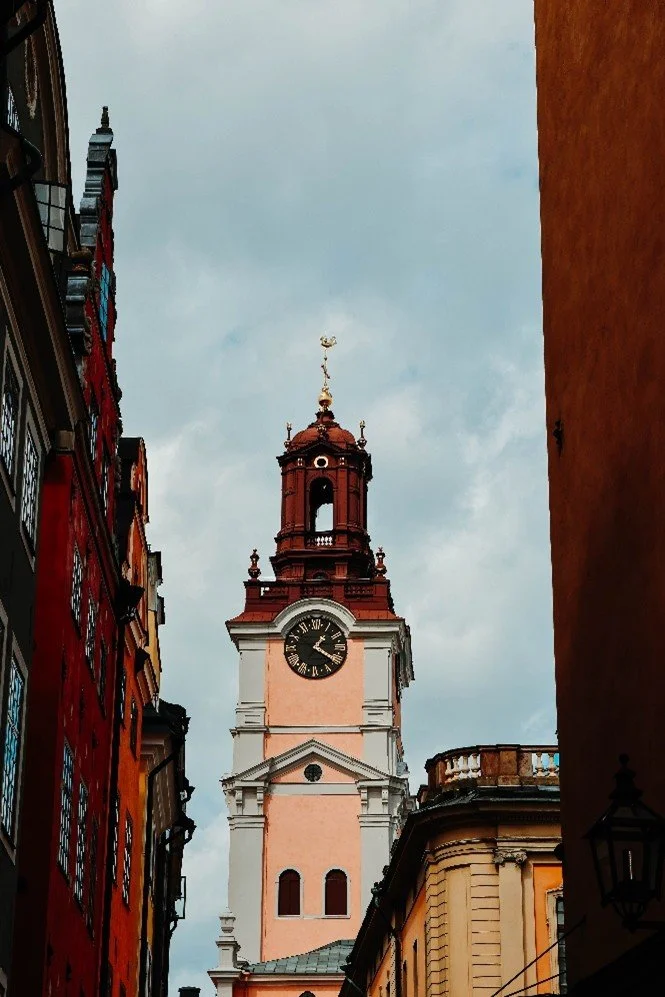
“The Keeper of Ticks and Whispers” As told by an old mouse named Thistle They call it the Tower of Elden, but I call it the heartbeat of the city. I’ve lived beneath its gears for longer than most humans have memories. My nest is tucked behind the third column on the left, just above the bakery that smells like cinnamon and secrets. Every hour, the great clock sings its golden song, and I listen—not to the chimes, but to the stories they carry. You see, time doesn’t just pass. It collects. It gathers in corners, settles in the dust, and clings to the walls like ivy. And I, Thistle the mouse, have been its quiet archivist. I remember when the painter with the crooked hat used to sketch lovers from his balcony. I remember the boy who raced the clock hands with his paper kite. I remember the woman who stood beneath the tower every day at noon, waiting for a letter that never came. Humans think they leave no trace, but they do. In sighs. In footsteps. In the way they glance up at the clock, hoping it’ll slow down or speed up depending on their hearts. One stormy evening, the clock stopped. Just like that—silence. The city held its breath. And I, old and creaky, climbed into the belly of the tower and nudged the gear with my paw. It groaned, then clicked. Time resumed. No one saw me. No one ever does. But that’s alright. I don’t need applause. I just need the tick. The whisper. The rhythm of lives unfolding. And so I remain, curled in my nook, listening to the tower speak. Because every tick is a tale. And every tale deserves a keeper. Connection to the Narrative This story deepens the emotional resonance of the clock tower image. The mouse, Thistle, becomes a metaphor for memory and quiet guardianship. His perspective turns the architectural beauty into something living—an archive of human emotion and history. The ornate tower isn’t just a landmark; it’s a vessel of time, and Thistle is its soul.

“Whispers Between the Walls” As told by a fox named Vesper They call it Muren Street. I call it home. I wasn’t born here, mind you. I wandered in one rainy dusk, paws damp, heart heavier than my fur. The alley was empty, save for the scent of old stone and stories. You see, these buildings—they listen. They remember. And I, a fox with nowhere to be, began to listen too. There’s a watchmaker who hums to broken timepieces. A girl who leaves poems folded into cracks in the walls. A lamp that flickers only when someone’s heart aches nearby. I’ve seen it all from the shadows, curled beneath balconies, watching the world forget and remember in equal measure. One day, I followed a trail of breadcrumbs—not the edible kind, but memories. A photograph fluttering from a windowsill. A child’s drawing of a fox, taped to a door. A whisper: “He always comes back when it rains.” That’s me, I suppose. The rainwalker. The silent witness. And today, as clouds gather again and the alley glows with that golden hush before the storm, I sit beneath the wrought iron lamp and wait. Not for food. Not for shelter. But for the next story to unfold. Because here, between these warm-toned walls, time doesn’t pass—it lingers. And I, Vesper the fox, am its keeper. Connection to the Narrative This story deepens the emotional texture of the setting—those narrow streets and historic facades become more than architecture; they become memory keepers. The fox, a quiet observer, ties together the human stories hinted at in the previous tale. Vesper’s voice adds intimacy and magic, suggesting that even in silence, the city speaks.
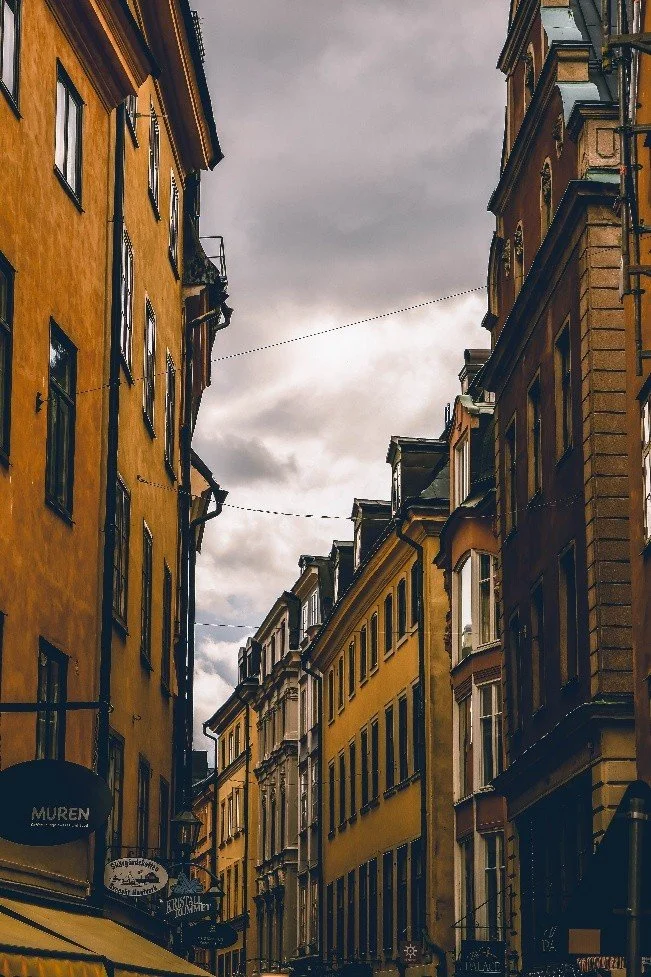
“The Echoes of Muren Street” In the heart of the old city, where cobblestones whispered secrets and buildings leaned in like old friends sharing gossip, lived a watchmaker named Elias. His shop, tucked beneath the sign that read MUREN, had stood for over a century, passed down through generations like a sacred trust. Elias didn’t just repair watches—he restored time. People came not only for ticking gears but for stories. A widow brought her late husband’s pocket watch, hoping to hear its heartbeat again. A young artist left behind a broken wristwatch, saying she needed time to forget. Elias listened, always quietly, always kindly. One stormy afternoon, a girl named Livia wandered in, soaked and silent. She held a small, rusted timepiece. “It belonged to my grandfather,” she said. “He used to tell me that this street remembers everything.” Elias smiled, took the watch, and began his work. As he opened its back, a faint melody played—a tune long forgotten, echoing through the shop like a memory reborn. Livia gasped. “That’s the song he used to hum.” Outside, the clouds parted slightly, casting a golden hue on the facades. The street, once empty, seemed to breathe again. Connection to the Image & Narrative The story mirrors the image’s quiet depth: a street steeped in history, where every building holds a memory and every shadow a story. The sign MUREN becomes a symbol of continuity—a place where time isn’t just measured, but felt. The moody sky, the empty street, the warm-toned facades—they all become characters in a tale of remembrance and quiet magic.